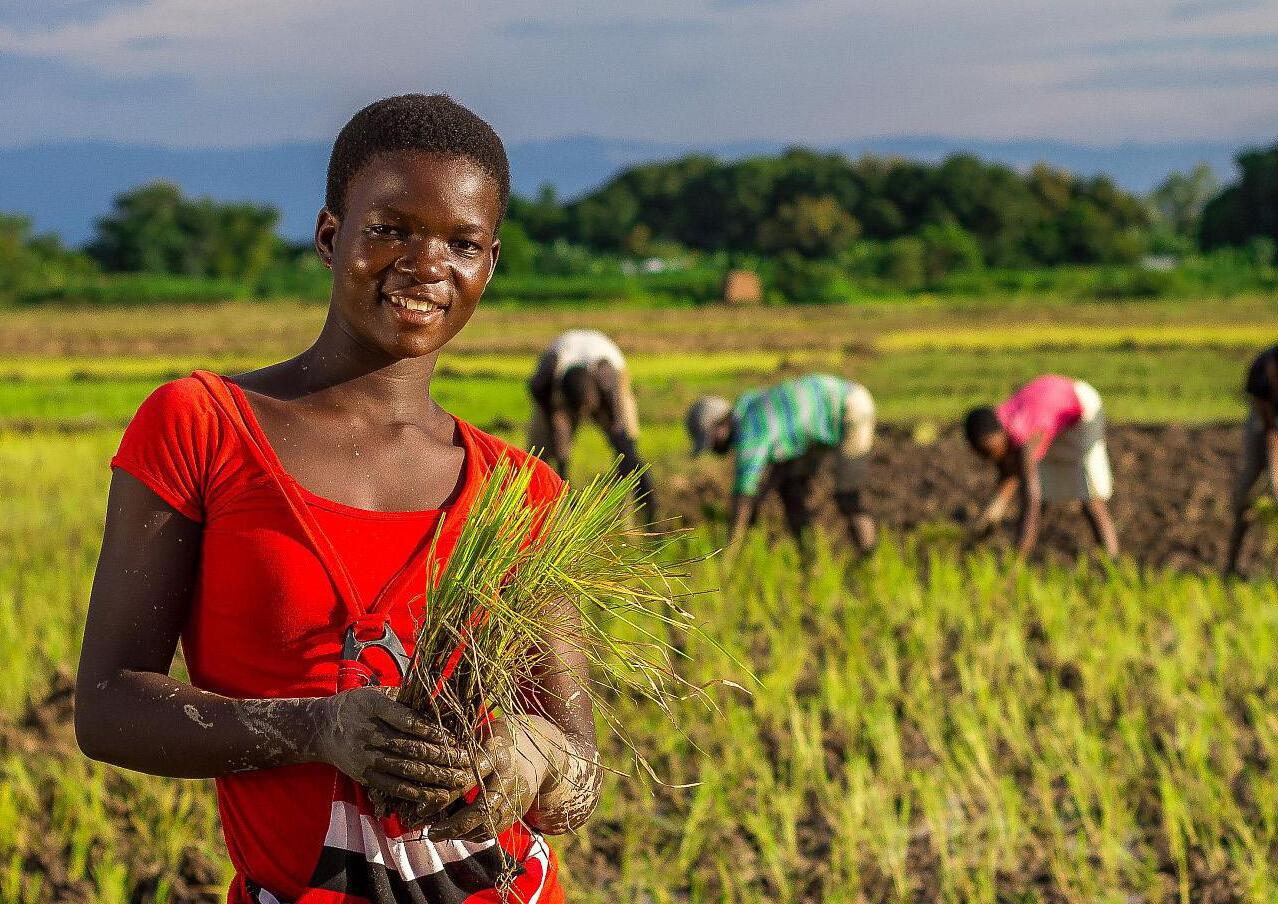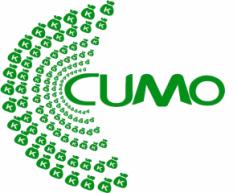






Sustainable livelihoods and healthy lives for all in a changing climate
Rising costs, economic pandemic challenges, conflict and extreme weather caused by climate change meant 2022 was another relentlessly hard year for the communities Self Help Africa work with in Africa and beyond.
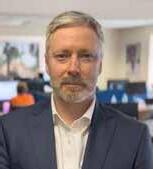
by Feargal O’Connell Chief Executive, Self Help Africa
In 2022, just as the world cautiously emerged from the grip of the COVID-19 pandemic, a global food crisis driven by climate change and fuelled by conflict tightened its hold on the communities we work with.
Referred to by some as ‘the year of the polycrisis’, 2022 saw our teams grapple with the impact of multiple emergencies overlapping. The economic aftershocks of the pandemic combined with the conflict in Ukraine, which pushed up fuel, food and fertiliser prices. Humanitarian needs rocketed and the number of people living in extreme poverty soared. Extreme climate-related weather events worsened disease outbreaks and continued to put pressure on the lives and livelihoods of rural poor communities.
Self Help Africa embarked on an initiative in response to the conflict in Ukraine responding to refugees’ basic humanitarian needs in Slovakia.
In East Africa, the worst drought in a generation left more than 23 million people experiencing extreme hunger. Crops failed to grow and livestock died, leaving one person likely to die every 48 seconds and millions of children experiencing the most deadly form of malnutrition (severe acute malnutrition).
Our teams worked with local partners to help families on both a short and longer-term basis, providing emergency supplies and vouchers to help families buy the essentials and ensuring farmers had access to drought-tolerant seed and the resources they needed for the next planting season. In
Bangladesh and Malawi, cyclones hit vulnerable communities the hardest – taking lives, displacing families, damaging homes, and destroying crops and livelihoods. Our experience in disaster preparedness and early warning systems meant we could respond quickly.
We joined international agencies, local disaster management committees and community-based organisations to assist affected communities, supporting them to implement cyclone preparedness and early action plans to help save lives and protect families’ valuable assets. Malawi also experienced the deadliest cholera outbreak in its history, leading the Government to declare a public health emergency in December 2022.
There is no denying the huge challenges facing the communities we work with in Africa and beyond. The number of people needing support remains staggering. But we know that the work we are doing in partnership with those communities, local and national Governments, civil society organisations, and other local and international organisations will enable disadvantaged and vulnerable communities to take greater control over their own lives in the longer term. It will help them earn more from their work and provide a better life for their families.

Feargal O’Connell, Chief Executive, Self Help Africa
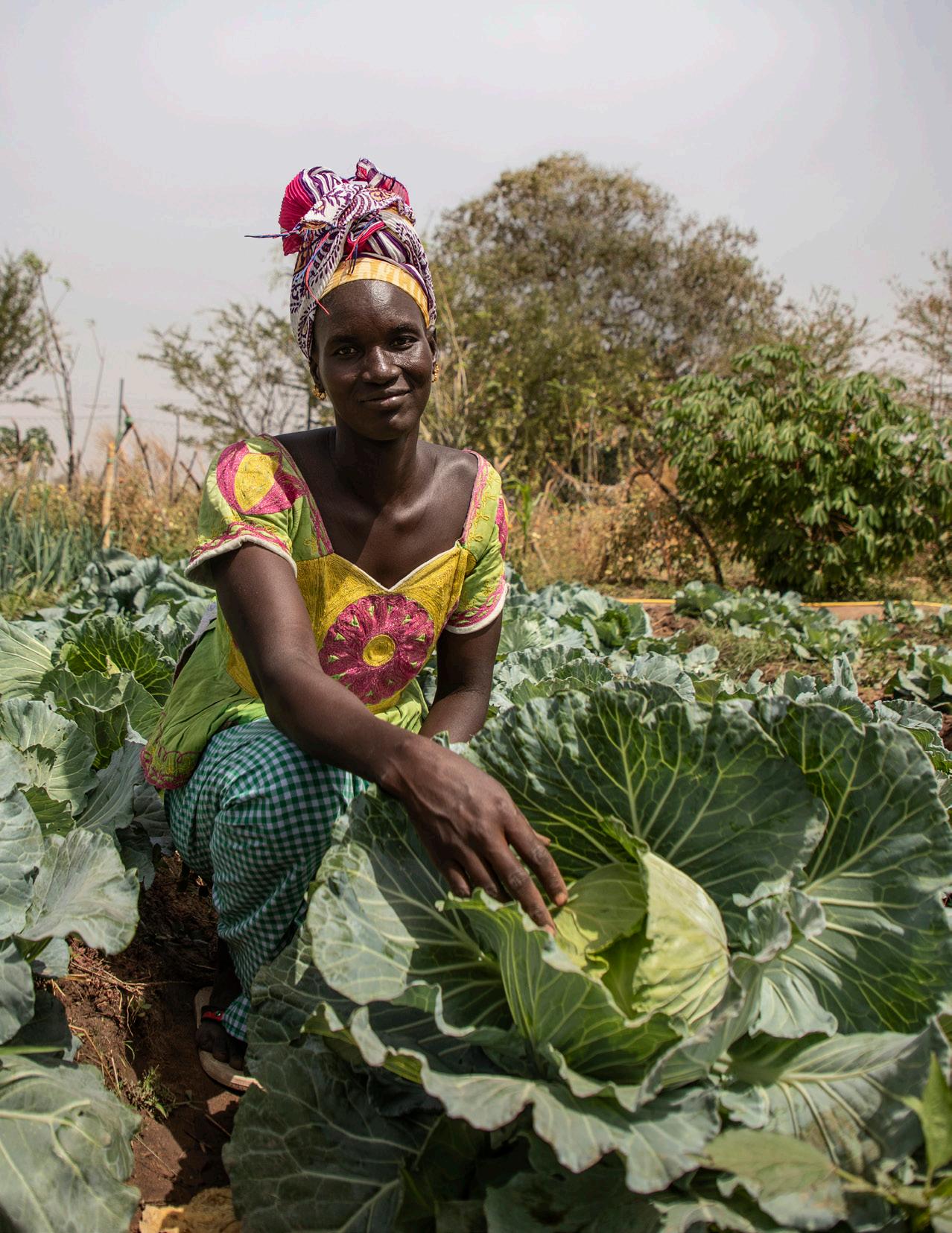
12 IN 2022, WE REACHED OVER MILLION PEOPLE
Over 70% of Africa’s poorest people live on small farms. We help these farming families achieve their potential to grow much more and earn more from their land.
We bring communities togetherworking as a cooperative means farmers can access new markets and earn a better income from their produce.
We’re working to level the gender field in sub-Saharan Africa. When women receive the same support as men, yields increase 20–30%.
We invest in people. Providing access to small loans through microfinance gives impoverished rural families the means to improve their farms, so they can grow, eat and sell more.
Those least responsible for climate change are the most affected by global warming. We support vulnerable communities to adapt to changing climate, through climate-smart agricultural techniques.
We nurture small businesses and encourage enterprise, enabling households to earn a vital alternative source of income.
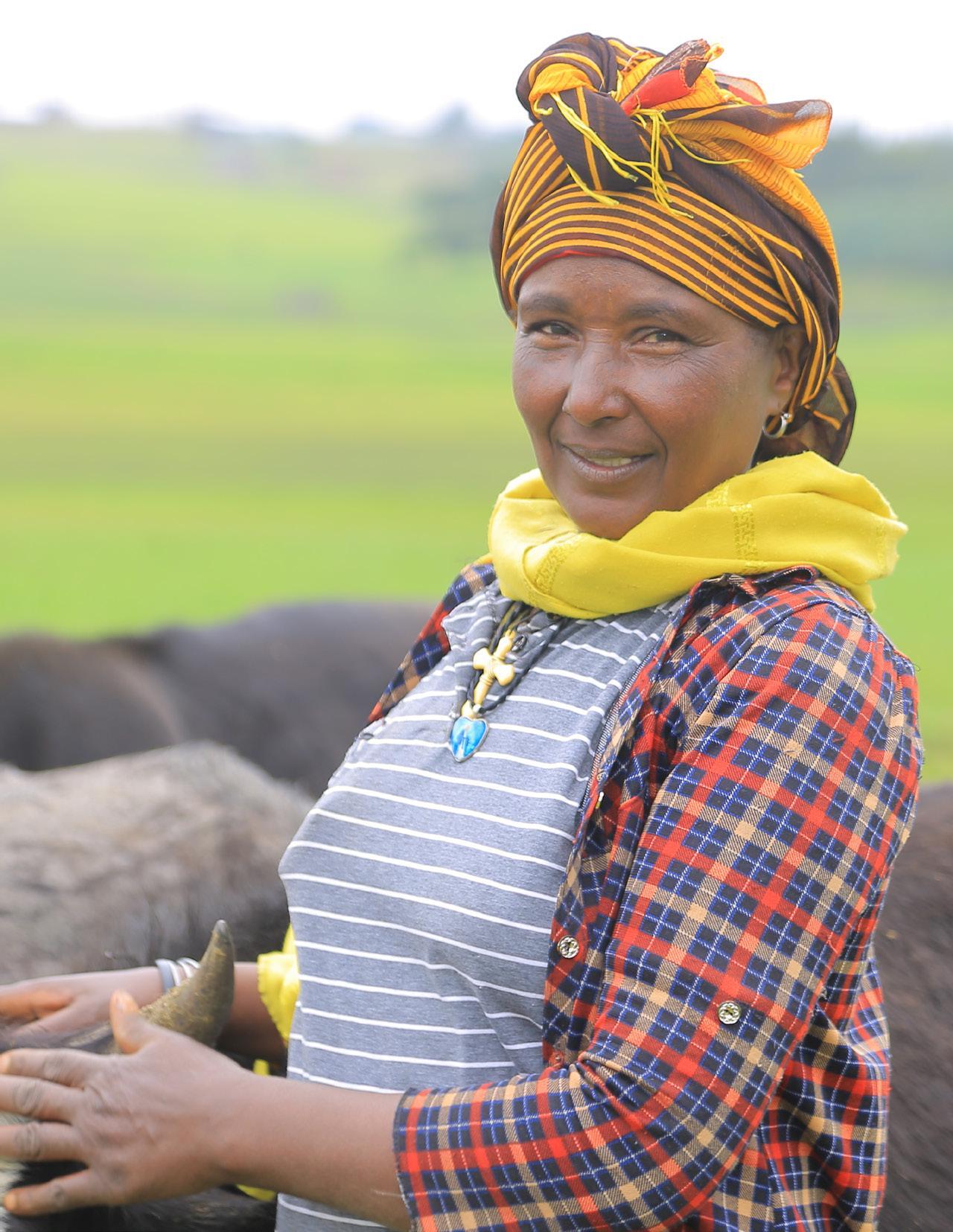
We aim to alleviate hunger, poverty, social inequality and the impact of climate change through community-led, market-based and enterprise-focused approaches, so that people have access to nutritious food, clean water, decent employment and incomes, while sustaining natural resources.

SELF HELP AFRICA SUPPORTED
375,972
HOUSEHOLDS TO ACCESS SUFFICIENT FOOD
North Kivu and South Kivu provinces, DRC State of Paribe
UG ANDA
E THIOPIA K ENYA
BURKINA FASO RWANDA,
MAL AWI
Z AMBIA
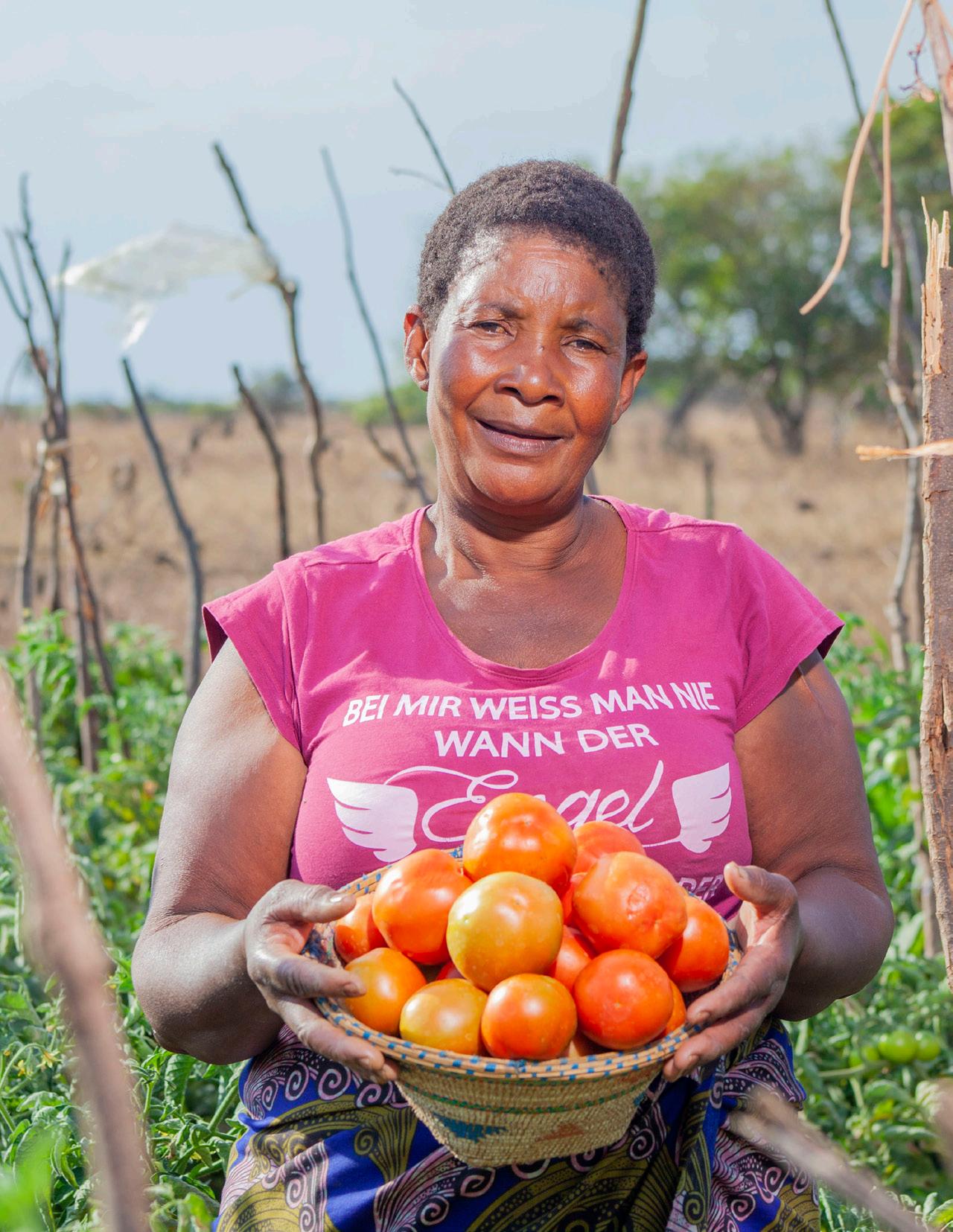
We work with women smallholder farmers like Edith Malambo in Zambia (pictured) to overcome barriers that limit their income potential.
347,337 Households with increased production
225,346 Diversified farming systems
22,576 Farming and savings groups
475,955 Households practising Climate-Smart Agriculture
*Excluding retail
89% PROGRAMMES
3% FUNDRAISING
8% GOVERNANCE

The
development of a
new five-year strategy provides a road map that can guide us in our work to alleviate poverty and hunger in the years ahead.
Self Help Africa commenced the development of a new five year global strategy, ‘Sustainability and Resilience in a Changing Climate (2023-2027)’, which was published in early 2023.
The new strategy positions the threat of climate change and the impact it has on rural poor communities as the context within which our future programme planning must be framed. The strategy defines the organisation’s goals and the necessary resources, as well as the impact measurements for its success.
Collaboration was key to the development of this new strategy. Planning and consultations took place at Board, programme country and headquarters level. An external consultant facilitated the process and supported the preparation of the new strategy. In addition, over 300 staff shared their views in an online survey circulated as part of the strategy’s development.
The new global strategy was formally adopted by the Board of Directors in early 2023. ‘Sustainability and Resilience in a Changing Climate’ acknowledges the recent and rapid growth within the organisation, specifically resulting from the merger with United
Over 300 staff shared their views in an online survey circulated as part of the strategy’s development.
Purpose, which added more than 500 staff to our organisation’s workforce in late 2021.
The strategy reshapes the organisation’s global mission as the alleviation of hunger, poverty, social inequality and the impact of climate change through community-led, market-based and enterprise-focused approaches. It outlines the primary focus of Self Help Africa’s work as supporting agriculture and food systems, maintaining sustainable landscapes, and providing support to communities to adapt to a changing climate.
‘Sustainability and Resilience in a Changing Climate’ follows ‘Embracing Change (2017-2021)’, which proceeded the integration of the operations of Self Help Africa and Gorta. ‘Embracing Change’ was extended for a further year owing to the COVID-19 pandemic.
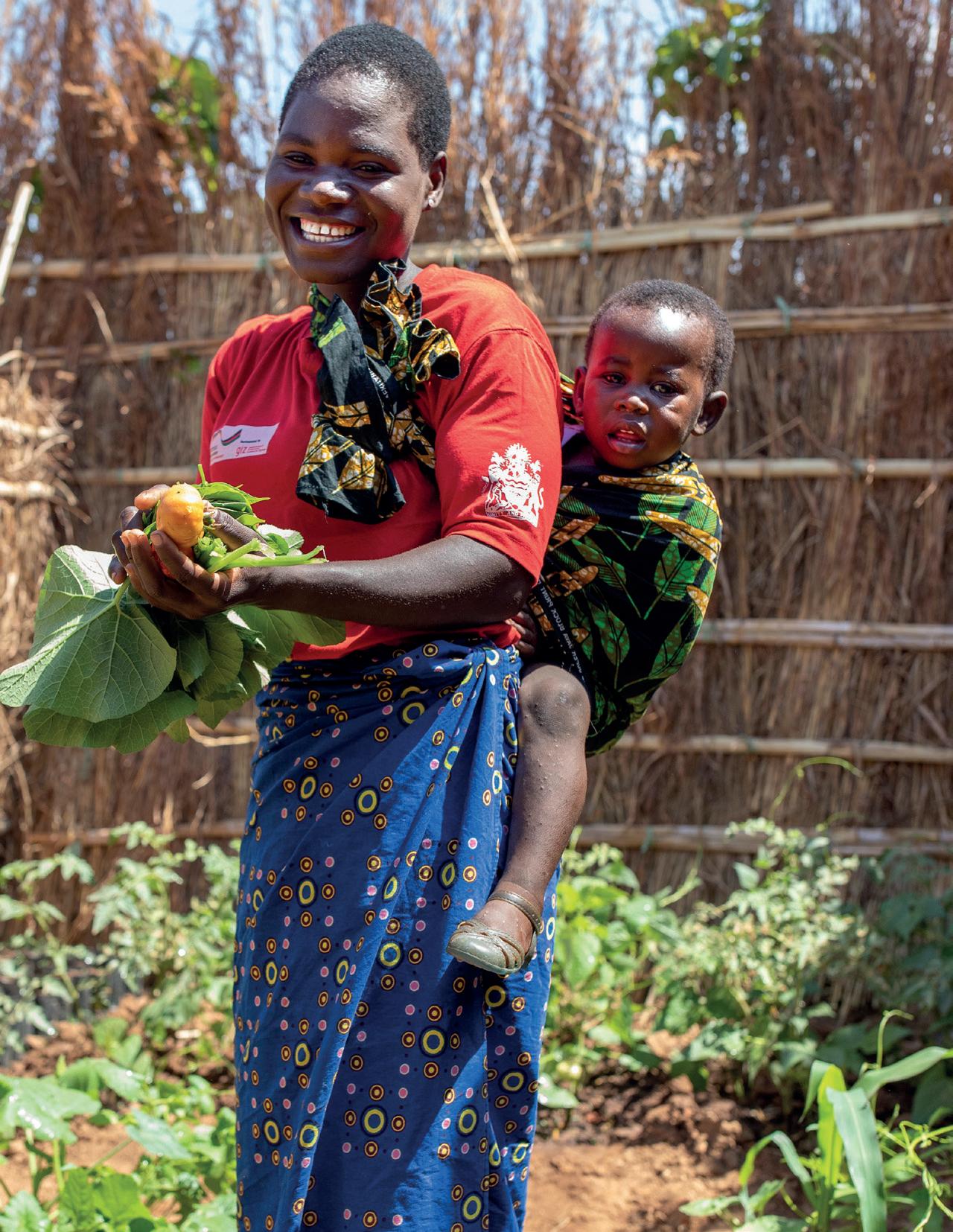
Climate change is an increasing threat to the world’s most vulnerable communities. Helena Škember, Regional Director for Southern Africa and Brazil, explains how we work with communities to boost their resilience.
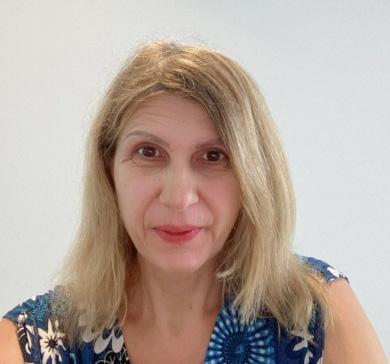
by Helena Škember Regional Director for Southern Africa and Brazil.
The rural, economically disadvantaged communities with whom Self Help Africa works are among the most vulnerable to climate change. For this reason, it’s becoming increasingly important that we can not only help people adapt to changing conditions, but can also mitigate the effects. Improving preparedness and early warning mechanisms are key components in this work.
Forecasting short-term local weather conditions in our programme countries remains an inexact science. However, global medium-term forecasts based on ocean temperatures are becoming very accurate, and longer-term climate change-related trends appear to be more closely following the predictions made by climate models.
At Self Help Africa, a significant challenge we now have in our day-today operations is to ensure that the forecasts being received reach the communities we work with in time – whether that is through radio, text messages or village councils.
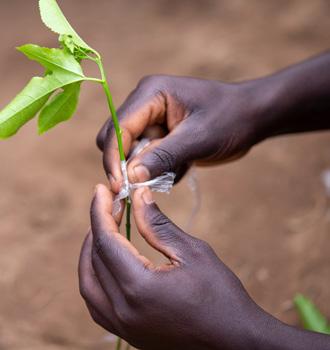
Too often in the past, farmers were warned about a coming drought when all they had were maize seeds unsuitable to survive the imminent poor rains and high temperatures.
Better meteorological and hydrological data is required to improve national weather and flood forecasts. Historically, meteorological stations tend to be sited at airports, agriculture research institutions and district offices. This left large gaps in coverage. Self Help Africa has been using a locally-based ‘citizen science’ approach to fill these gaps.
In Malawi and Zambia, this local infrastructure includes close to 100 manual and automatic weather stations that have been set up in primary schools and community centres. At these facilities, data is collected on a daily basis by community members, shared with the wider community and sent by SMS to district meteorological offices. River-line gauges have also been installed to warn downstream communities when river waters may be rising.
Following heavy rains in 2019-20, linked to the reversal of currents in the Indian Ocean (Indian Ocean Dipole), Eastern Africa experienced several years of drought associated with the La Niña reversal of currents on the Pacific Ocean (ENSO).
Recently, that situation has reversed. The planet is now experiencing the start of a new El Niño event. This will reduce rainfall in Southern Africa,
Eastern Bangladesh, Southeastern Brazil, and will also increase rainfall in Eastern Africa.
In preparation for the anticipated poor rains in Zambia, Malawi and Mozambique, Self Help Africa staff are advising farmers to take out insurance before premiums rise, and to adopt conservation agriculture minimum tillage approaches that were proven to be an effective way of minimising crop losses during the 2018-19 El Niño.
Farmers are also being advised to access drought-tolerant seeds for more resilient crops, including pearl millet, sorghum, cassava, cowpea, Bambara groundnuts, and chickpeas. Opportunities to deepen water wells and steps to introduce school feeding programmes are being examined.
Self Help Africa staff are preparing communities in East Africa for heavy rains, and an anticipated increase in water and mosquito-borne diseases and the possible displacement of people living in the low-lying areas around the fringes of Lake Baringo, Kenya. Self Help Africa’s soil and water conservation structures in the mountainous region of Southwest Uganda effectively protected the community from landslides during the heavy rains of 2019-20, so these structures are being repaired to cope with heavy rains.
With an increasingly hostile climate and extreme weather events being experienced all over the world, working with local communities to adapt to, and cope with, the worst effects of the climate crisis will become increasingly important to Self Help Africa’s programmes in the future.
It is important we help people adapt to the conditions and mitigate the effects of climate change.
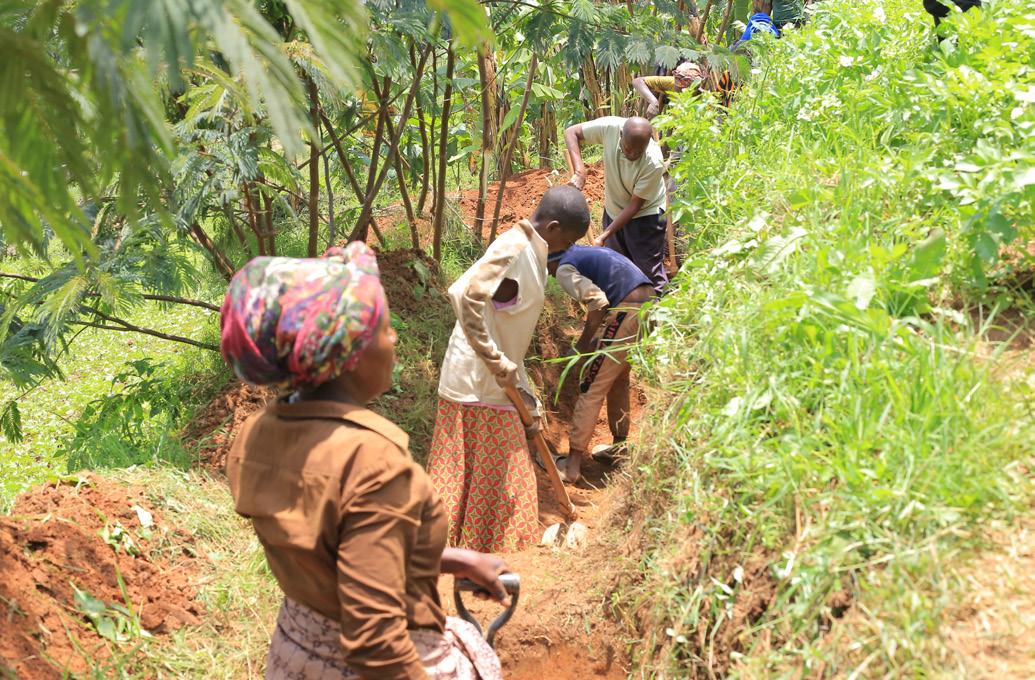
Edward Meleki,
Senior
Global Advisor
and
explains why land restoration, conservation and management is a vital part of our work.
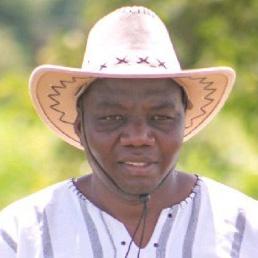
by Edward Meleki Senior Global Advisor on Climate Change, Agroforestry and Natural Resource Management.
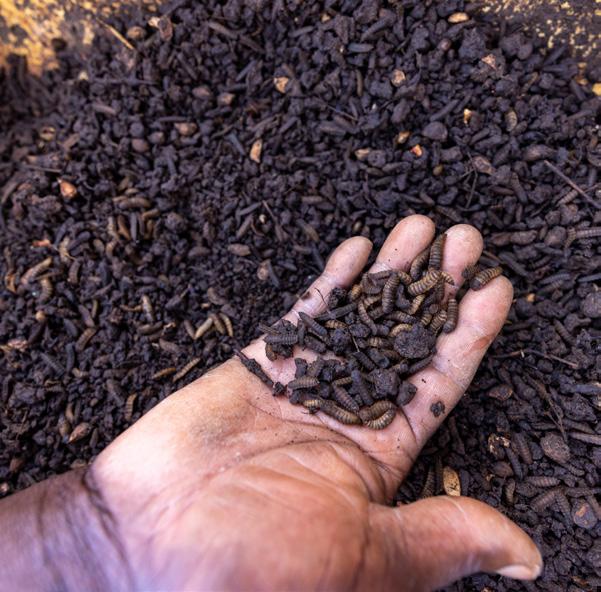
Natural resources on farms and communal land are among the most precious assets available to the people with whom Self Help Africa works.
Therefore, the protection, preservation and rehabilitation of these lands and environment are critical, if they are to provide and support a sustainable future for these communities.
Across Self Help Africa’s portfolio, smallholder farmers, as the principal custodians of the land, are engaged in a range of community natural resource management activities designed to conserve natural
We must ensure land use is sustainable and support efforts to restore, conserve and rehabilitate lands that have become degraded and depleted.
resources. Conserving these precious natural resources in various ecosystems ensures a continuous and sustainable supply of products and services derived from them.
Both food and non-food products are derived from the restoration, conservation and careful stewardship of natural resources. But, the benefits don’t end there.
A well-conserved and managed ecosystem also provides communities with nutrient cycling, water cycling, soil formation and retention, as well as habitats of various fauna and flora, pollination of crops, decomposition, erosion and flood control, reduction of siltation and landslides, water purification, carbon storage and climate regulation.
In the face of increasing and relentless pressure placed on natural resources by rising human populations and climate change effects, we must redouble our efforts. We must ensure that land use is sustainable, and support efforts to restore, conserve and rehabilitate lands that have become degraded
and depleted. It is only by doing this that we will bring back disappearing biodiversity, and restore the natural structure and systems of forests, grasslands, soils, hills, mountains, streams, lakes, rivers, and oceans.
Self Help Africa has been working to restore, conserve and manage degraded and degrading landscapes through afforestation, reforestation, and revegetation in a broad range of our programmes, including in Ethiopia, The Gambia, Kenya, Malawi, Senegal, Uganda and Zambia.
As of December 2022, a total of 26,975 hectares were under natural resource management practices and plans. This enables these areas to be fully restored, conserved, and managed by farmers. We are currently working with more than 100,000 smallholder farmers, supported by 316 Community Natural Resource Management Committees to enhance agrobiodiversity and conserve various ecosystems in farming landscapes.
Over the coming years, Self Help Africa will continue working with Community Natural Resource Management Committees and more than 200,000 farmers to restore, conserve and manage slightly over 150,000 hectares of degraded ecosystems (Marine and Terrestrial) and grow 35 million diverse trees species through tree planting and/or natural regeneration in various projects.
More than three quarters of a million energy-saving fuel stoves have been distributed by United Purpose and Self Help Africa in Malawi in the past decade.
The ‘Chitetezo Mbaula’ stoves (which means ‘protecting stove’ in local dialect) project has generated approximately €400,000 in additional income for the mainly women's groups who manufacture the clay devices, while generating over €150,000 more in income for the traders and agents who sell them.
In a country where just 14 per cent of households have access to electricity and where most rely on open fires and charcoal to meet their home cooking needs, the initiative has halved fuelwood consumption, reduced pollution and saved time and money for local households using the stoves.
Not only do the stoves require less fuel for cooking, they also burn on alternate energy sources,
including maize cobs, pigeon pea stalks and other crop residues. This means fewer trips to collect firewood, which expose women and girls to greater risk of sexual assault and violence.
The name ‘Chitetezo Mbaula’ refers to both the safety of the device and its ability to protect forestry in a country that has lost more than 30 per cent of its tree cover in the past 40 years. The stoves have an average lifespan of three to four years.
In an associated initiative, Self Help Africa has also begun promoting the use of a complementary alternative ‘Zipolopolo’ (meaning ‘bullet’ in the local language) stove, which burns pellets made from agricultural waste –specifically compressed groundnut shells – as an alternative to illegal, unsustainably produced charcoal, which is the dominant cooking fuel for urban households and one of the leading causes of Malawi’s deforestation.
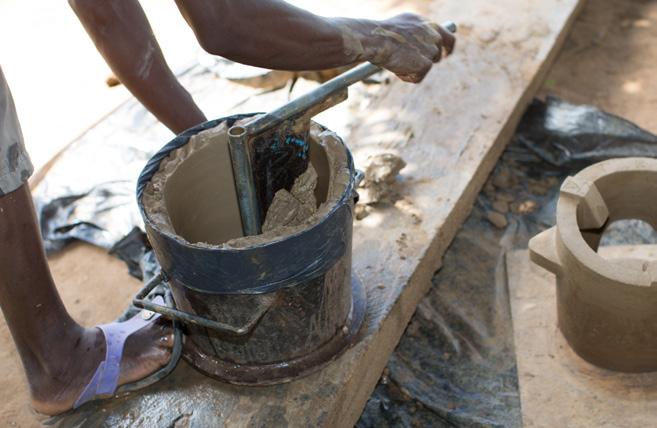
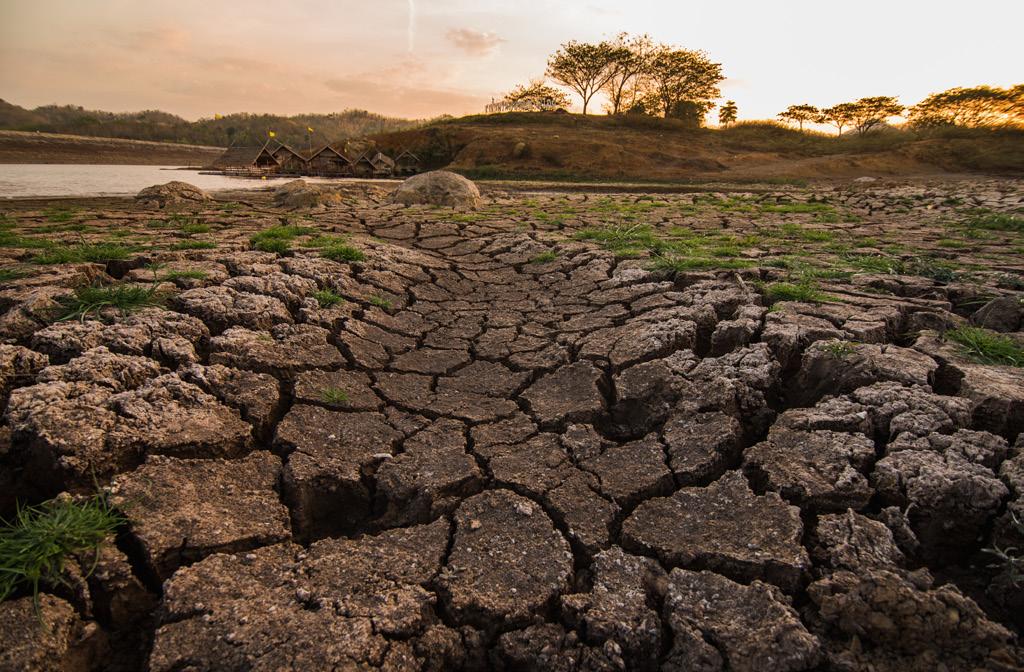
Sub-Saharan Africa is currently in the grip of a food emergency that is as big and complex as the continent has ever seen.
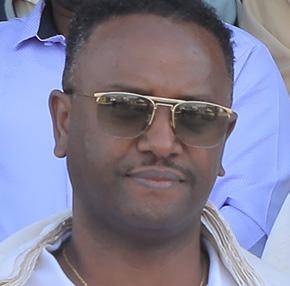
by Dinkneh Asfaw Regional Director for the Horn of Africa.
More than one in five Africans – that’s more than 280 million people – are reliant on food aid for at least part of the year, according to data from the UN Food and Agriculture Organization.
East Africa has been in the grip of the worst drought in a generation. At one point, it was estimated that one person every 48 seconds was dying from hunger across drought-ravaged Kenya, Ethiopia and Somalia. Unprecedented successive failed rainy seasons has led to the death of millions of livestock. Countless crops failed, ruining livelihoods.
It was the fourth successive year of drought for East Africa. By year end, the number of people in need of emergency food aid spiked by 60 per cent compared to 2021. In 2022, East Africa endured its fourth successive
Countless crops have failed, ruining livelihoods
year of failed seasonal rains. By year end, 22 million people across Ethiopia, Kenya and Somalia faced acute food insecurity, as the region endured its worst drought in more than 40 years.
But climate change is just one of the causes of the current hunger crisis. Conflict, heavy debt burdens following the COVID-19 pandemic and spiralling commodity prices have all worsened an already difficult situation.
In the wake of the COVID-19 pandemic, sub-Saharan African countries have also struggled to pay their
debts. The International Monetary Fund (IMF) estimated that 19 of the region’s 35 lowest income countries were in debt distress.
COVID-19 also caused international aid investment originally earmarked for Africa to be redeployed to support and mobilise health services across the world to respond to the pandemic. Russia’s invasion of Ukraine in February 2022 had consequences for Africa too.
Western aid to Africa fell by close to 20 per cent in the months following the conflict, as wealthy countries in the West turned their attentions to the crisis unfolding in Eastern Europe.
Disruption to oil and gas production in the conflict zone forced up global fuel and fertiliser prices and availability, which had a knock-on effect on food availability and production, with the production of maize, rice and wheat all falling in 2022. Many African farmers were among the worst hit by the shortages as traders and producers prioritised the biggest markets.
Food security is at the heart of Self Help Africa’s work across 15 countries in Africa, as well as Brazil and Bangladesh. We consider agriculture the key to ending hunger and poverty in rural areas.
To support smallholder farmers affected by the fertiliser shortages, Self Help Africa shared its expertise with smallholder farmers so they could better diversify their crops and adopt climate-smart agricultural practices that do not rely on synthetic fertilisers.
In light of the alarming rise in global hunger statistics in 2022, this work is more vital than ever.
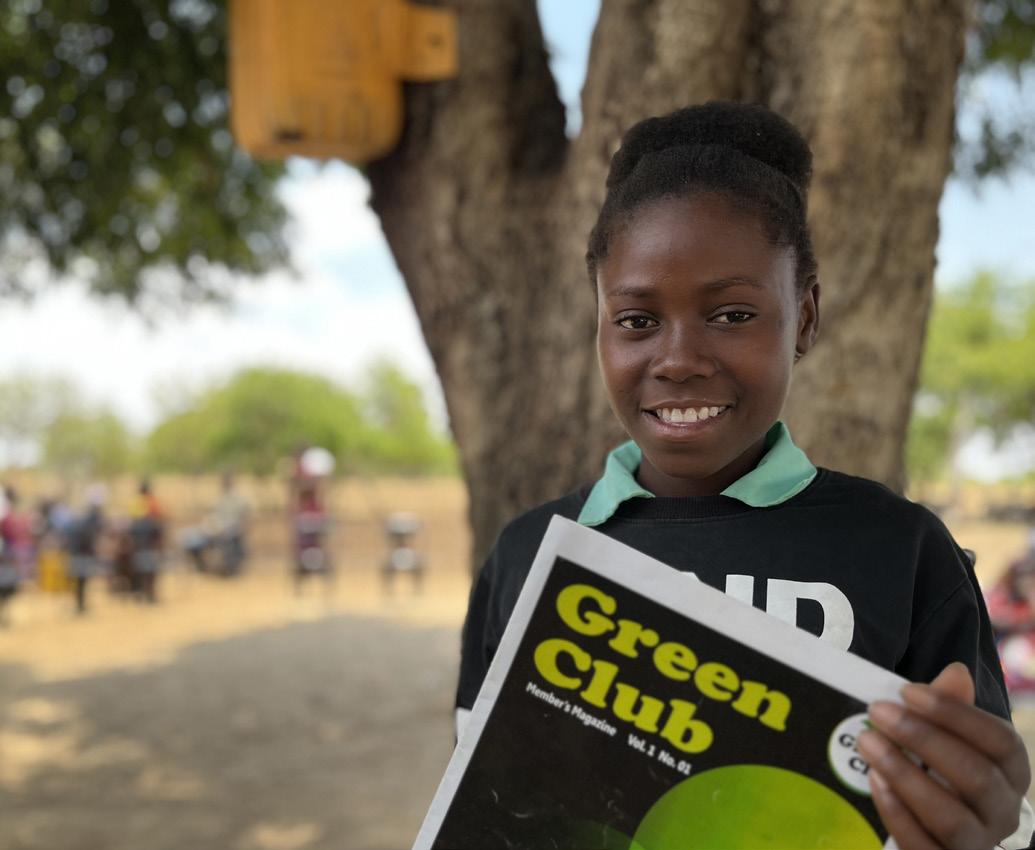

CUMO Microfinance is one of Malawi’s largest microfinance service providers with a focus on working with extremely rural communities.
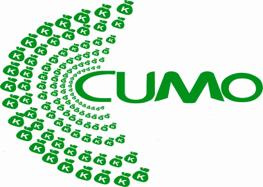
CUMO Microfinance is a rural bank that started as a small pilot project to provide loans to just 100 rural farmers in Malawi over 20 years ago. Since then, CUMO has grown exponentially. Last year, it disbursed €6.8 million of loans to its rural and economically disadvantaged client base.
The bank has more than 72,000 members and a network of 4,368 Village Savings and Loans Associations, which it operates in 23 of Malawi’s 28 districts.
CUMO provides loan services tailored to client needs. Most borrowing is linked to on-farm agro-processing and smallholder farm trading activities.
Recently, the bank became the first finance institution in Malawi to offer life insurance to small-scale farming households and insurance to farmers to protect against crop failure.
The bank, which was a part of United Purpose, is now part of our group.
Established in 2000 as a project funded
by the UK’s Department of Foreign and International Development (DFID), CUMO Microfinance has - in four of the past eight years - been awarded the highest compliance rating by the Reserve Bank of Malawi, the only non-deposit taking institution to have achieved such a rating.
Alongside its comprehensive package of banking services, including savings, loans and insurance services, CUMO also supports its rural membership with a range of financial literacy and entrepreneurship support through a digitised mobile CUMO Entrepreneurship Training Centre.
Since the Centre’s inception, an estimated 76,000 Malawians have accessed training services.
Most (84 per cent) of CUMO’s clients are women and many access loans to support agro-processing and other farm trading activities. Nearly all (96 per cent) of the bank’s clients live on less than two acres.
CUMO, which is run from a head office in Lilongwe, has also been involved in supporting social cash transfer programme recipients - assisting people in receipt of cash transfer humanitarian aid to start savings.

This allows them to accumulate assets, start small businesses and achieve a higher degree of financial security.
Most of CUMO’s clients are women and many access loans to support their farming.

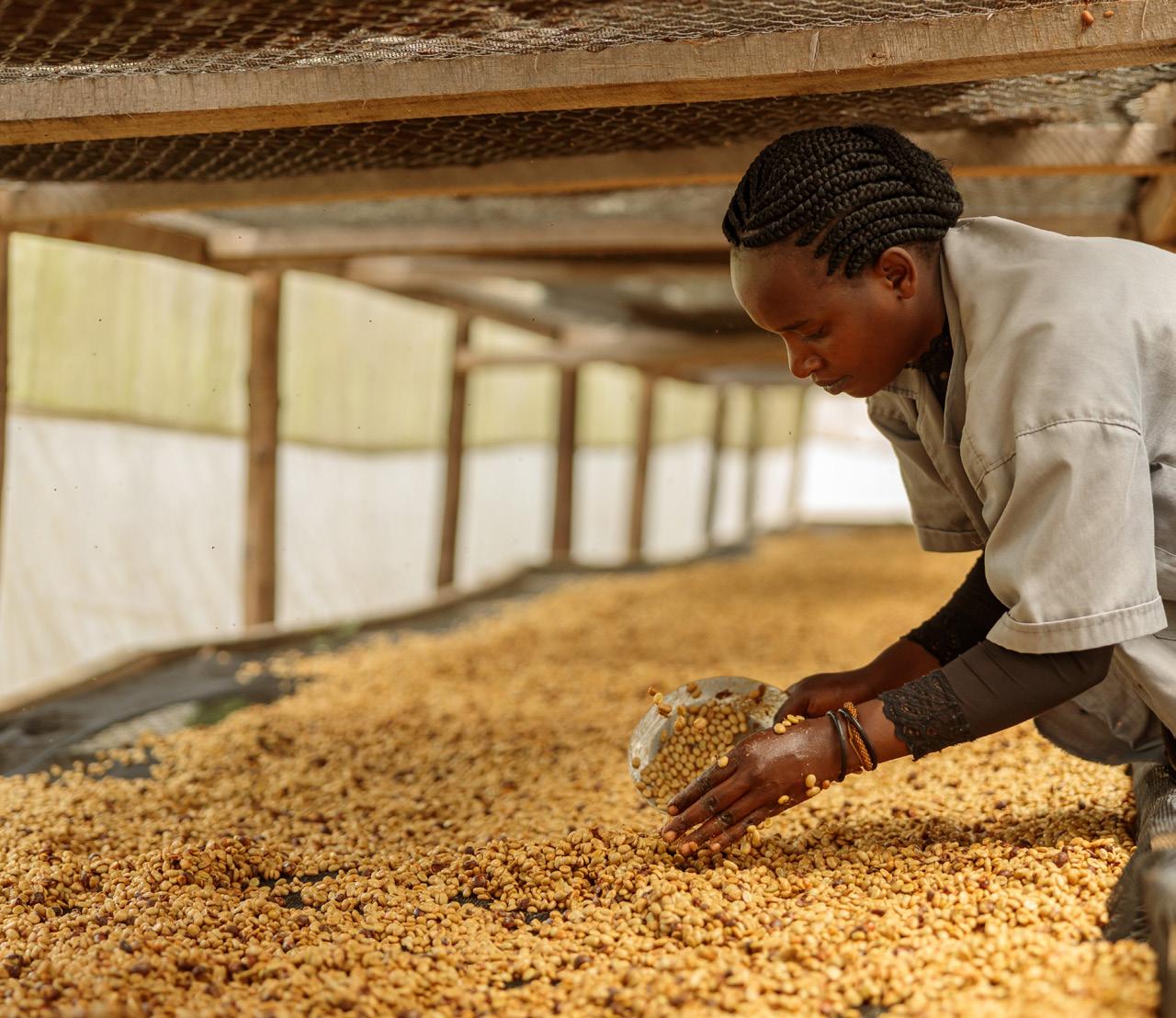
2022 proved another productive and busy year for Partner Africa as it continued to support companies in Africa to improve conditions for thousands of workers across the continent.
Self Help Africa subsidiary Partner Africa carried out 920 social audits that reached more than 160,000 workers and contributed to improving the working conditions of 42,000 workers in Africa, in 2022.
A new five-year strategy was launched in 2022. Partner Africa sought to broaden its remit to provide companies with premium quality social audit, advisory and
training services that enabled them to achieve the highest social and environmental standards in their organisations and supply chains in Africa.
In 2022, Partner Africa marked its 10th anniversary. During the year it applied for International Organization for Standardization (ISO) accreditation, in order to develop a certification programme for its clients.
PA’s team across Africa and the UK worked together to deliver audits and advisory services to 25 industries and value-chains. This work happened mainly in agriculture, but also took place in the manufacturing, food and beverages sectors, across a total of 33 countries.
Partner Africa’s activities effected changes in the workplace in 180 facilities and sites where issues of non-compliance with conditions and regulations were addressed and rectified.
17 training programmes were carried out with companies and suppliers in the Business and Human Rights (BHR) area, while training was provided to 15 businesses, suppliers and farmers groups, and with over 100 auditors.
In 2022, Partner Africa also launched its first ever impact report, which provided detail of its work and the impact that it has had in different value-chains. A copy of the report is available at this link: partnerafrica. org/partner-africa-annual-reports
Among the specific projects completed by Partner Africa in 2022 were a Human Rights Impact Assessment for the tea sector in Kenya, a gender-sensitive auditing pilot that applied a new Sustainable Supply Chains (SEDEX) auditing methodology across several countries, a Human Rights Risk Assessment within the honey sector in Zambia, and an assessment into payments, contracts and other worker rights issues in the energy sector in Angola.
In 2022, Partner Africa contributed to improving the working conditions of 42,000 workers in Africa.

Through our sister organisation United Purpose, Self Help Africa has been responding to the Rohingya refugee crisis since hundreds of thousands of people fled to Bangladesh.
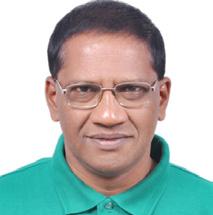
by Sriramappa Gonchikara Country Director, United Purpose Bangladesh.
In late 2017, hundreds of thousands of Rohingya, many of them children, made the frightening exodus from Myanmar in a desperate bid to escape violence and ethnic cleansing. They joined around 300,000 refugees that were already living in southern Bangladesh, following previous displacement.
Today, almost a million Rohingya are living in refugee camps in Cox’s Bazar in Bangladesh, entirely reliant on humanitarian assistance for protection, food, water, shelter and health, and living in temporary shelters in highly congested camp settings. Their presence has had an adverse knock-on effect on local communities too. Farmers and fishermen have been displaced, and farmlands already vulnerable to flooding and cyclones have experienced degradation and further depletion of the region’s limited natural resources.
With support from the International Organization for Migration (IOM) and Global Affairs Canada, United Purpose, the sister organisation of Self Help Africa, formed 54 self-help groups amongst the host community in Bangladesh, and provided business development and management training to more than 2,800 people, 87% of whom were women.
The initiative supported the development of 3,500 adaptive business plans by host community members whose livelihoods had been lost or affected
Our efforts include social cohesion and climate change resilience.
by the large influx of refugees into Cox’s Bazar, and supported a further 1,350 people to scale up their existing businesses through technical training.
The latest work builds on previous United Purpose activities, and follows efforts supported by IOM to create several thousand new job opportunities for young people who had lost their farmland or jobs to Rohingya refugees settled in Cox’s Bazar. Importantly, these efforts included social cohesion and climate change resilience programming to limit the complex nature of the emergency and the growing risks of severe weather events and violence between Rohingya and the host community.
In the coming years, we will seek to work with local partners, including civil society and public sector, to strengthen local capacity to create contextualised livelihood and peacebuilding programming in the region as part of the Grand Bargain, an agreement between the biggest donors and aid organisations, that aims to get more means into the hands of those who need it.
United Purpose has been supporting response to the Rohnigya crisis in Cox’s Bazar, Bangladesh.
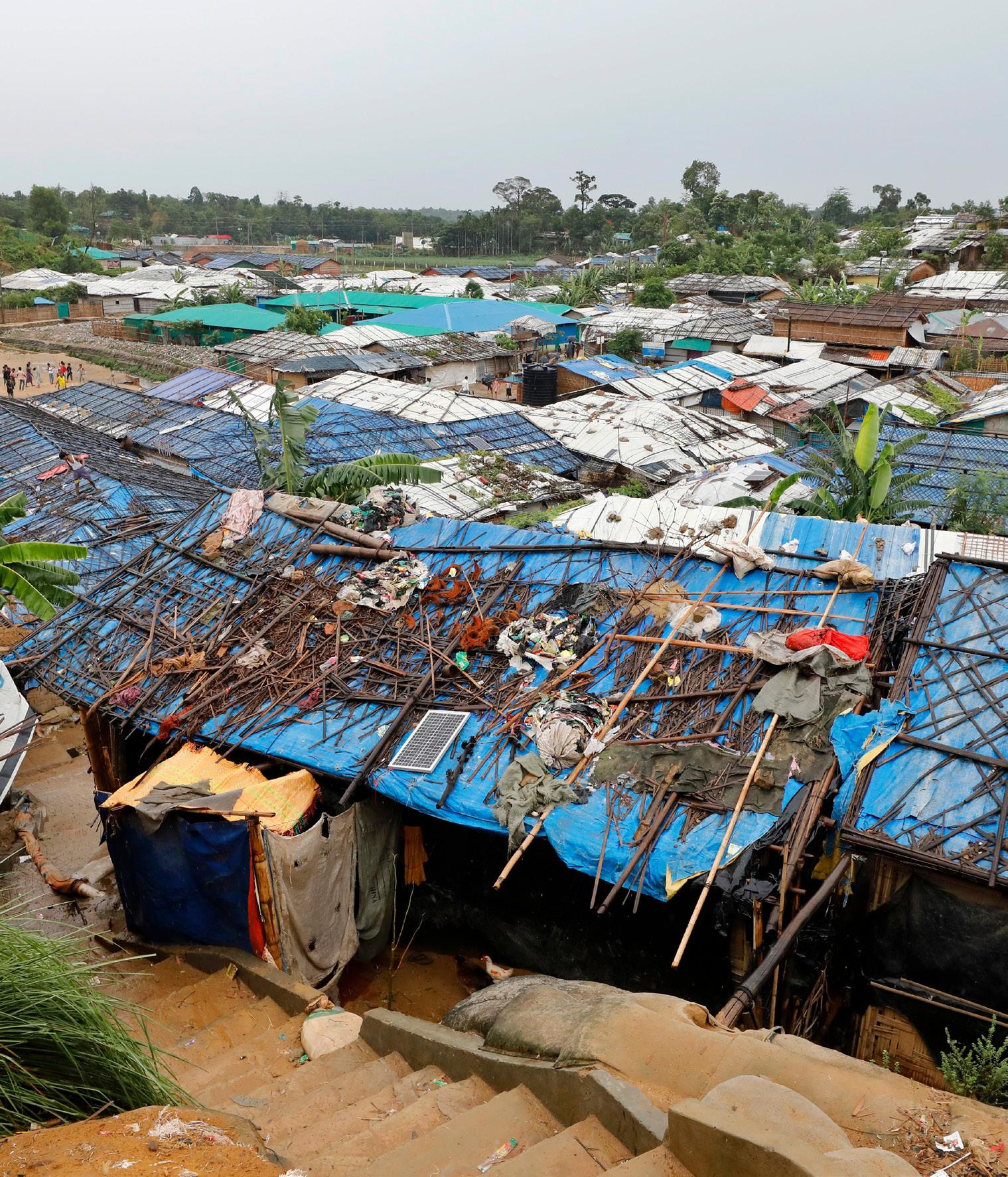
Chuma Malambo has become a role model for her family, after joining a local youth group in Monza District in southern Zambia less than three years ago.
Chuma’s family was inspired to follow her footsteps into cassava production, after witnessing the success that Chuma has enjoyed since her group first began planting drought-tolerant cassava cuttings on a fencedoff plot of land in Hatila village.
Aged just 23, Chuma began earning an income selling cassava leaves, stem cuttings and tubers, which a local processing plant is buying from her youth group.
Cassava growing requires minimal initial investment. Group members have reinvested profits from their sales to invest in different income generating activities. In Chuma’s case, she has bought poultry to rear and
breed, and is also benefitting from a grove of fruit trees that her group have planted. This provides them with both good quality food to eat, and an additional product that they can sell to earn an income.
“Since I started earning my own income from these enterprises, my family has been motivated to invest in both cassava production and in poultry,” she says.
Chuma is among hundreds of young people in the Kafue Basin region of Zambia being supported by an Irish Aid-backed project that is seeking to preserve the local environment and support the emergence of a vibrant local economy that helps farmers develop sustainable value chains. The project is also nurturing initiatives using biofortified crops that significantly improve the concentration of particular nutrients.


When the solar-powered water system supplying Fatou Mjie’s village broke down, the community didn’t have the resources or training to fix it.
Like many others in Touba Pakala village, in The Gambia’s Central River Region, the 30-year-old rice farmer had to spend most of her day walking to fetch water.
Supported by Self Help Africa’s sister organisation, United Purpose, the solar-powered system has now been repaired, and is providing a safe, clean supply of water, giving precious hours back to Fatou and the many other women and girls traditionally tasked with water collection. The work is part of a project in The Gambia being funded by the Waterloo Foundation, FORSA and Dublin City Council.
“I walk to this community tap eight times a day to fetch water because I cook, wash dishes and wash clothes, and those activities all require water,” said Fatou, a rice farmer and village water committee member.
“We now have extra time to do other activities and it reduces the stress and hassle of collecting water outside our community. We also have time to relax and enjoy a little time off for ourselves.”
In many rural areas of The Gambia, hand pumps are breaking or have broken, and even newly-installed solar-powered systems, like the one in Fatou’s village, require ongoing maintenance.
United Purpose and local partners are collaborating with local communities to make access to safe water more sustainable.
Village committees are making decisions on water point management, and fees are being charged for water use, with the money then made available for management and maintenance.
A network of local mechanics is now on hand to fix pumps, while a solar company has been retained to establish service contracts with rural communities and make regular maintenance visits.
Fatou, who relies on small-scale farming to earn a living, is keen to establish an irrigation system that would allow women like her set up their own market gardens. At present, she walks several kilometres to farm rice, taking her away from her children for long periods of each day.
“A vegetable garden would reduce the frequency with which I would go to the rice field for work and would allow me more time to give good care to my children,” she said.
Food allergies and respiratory distress had made life at the refugee camp in Bangladesh’s Cox’s Bazar particularly difficult for 65-year-old Rohingya widow Fatema Bibi, whose symptoms always worsened when the weather was extremely cold or hot.
For Fatema and many Rohingya refugees living in Cox’s Bazar, living conditions were difficult and access to medical services was limited.
To address this challenge, in partnership with local health and family planning staff, United Purpose launched its ‘Survival Assistance for resettled Rohingyas through the continuation of humanitarian response and COVID-19 preventive Action’ project (SARA, for short). The project has been offering health outreach services at two camps where Rohingya refugees like Fatema can benefit from primary healthcare and infectious disease management.
After visiting one of the camp’s doctors, Fatema was diagnosed with asthma and musculoskeletal problems and given an inhaler and pain medication. A week later, a follow-up appointment confirmed her condition had improved and she started to feel better.
“Without this health post it would have been very difficult for us to get the treatment in this camp area, as there is no other health post near us,” she said. “They provided me with medicine and advice that has helped me to survive in this difficult time. I am grateful to all of them from the bottom of my heart.”
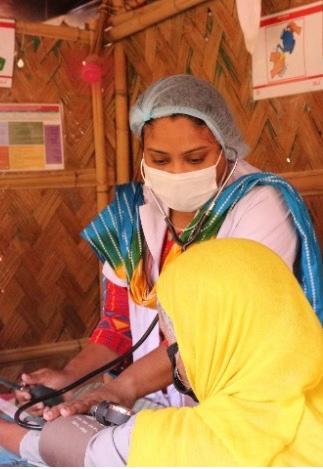
To help prevent the spread of infectious disease, the SARA project has sought to strengthen hygiene and sanitation practices by running two portable water supply networks in the camps that provide more than 1,300 households with fresh water every day.

Every morning before he leaves for his work, smallholder farmer Ephraim Kamtedza, from Malawi, prays for guidance. The 48-year-old’s green field, just visible from his home, is evidence of the hard work he puts into growing food yearround for his six children.
Ephraim grows nutritious, high-yielding orange fleshed sweet potato, and is also a member of a local village savings and loans (VSL) group, with whom he saves.
In Balaka district, where climate change has caused rains to be unpredictable, irrigated farming is essential to grow crops like the orange fleshed sweet potato sustainably. However, most farmers lack the resources needed to purchase farming inputs and the necessary irrigation technology.
“At first I used to hire a pump to help with irrigation,” Ephraim explained. “This was both expensive and time-consuming.”
In 2020, he invested his profits from sweet potato sales, and a loan from his VSL group to buy a motorised water pump. It cut down on his overheads, and saves him thousands in leasing fees every season.
When Tropical Storm Ana hit in January 2022, Ephraim’s farm work was disrupted. He took out a village loan and bought five 50kg bags of rice, which he then traded. The profits he made from selling rice went back into the farm, and also provided additional income to support his family at a difficult time.
As a member of the VSL group, Ephraim was trained in VSL leadership, group dynamics, borrowing and loan management. He is now a VSL community-based trainer, overseeing five local groups with around 100 members.
“The food I produced used to run out by November, forcing me to buy food until my next harvest in February,” he said. “At times my family struggled to eat. Now, I’m growing sweet potato commercially, and have been able to sell and make money from it. I’m reinvesting that money in so many ways.”
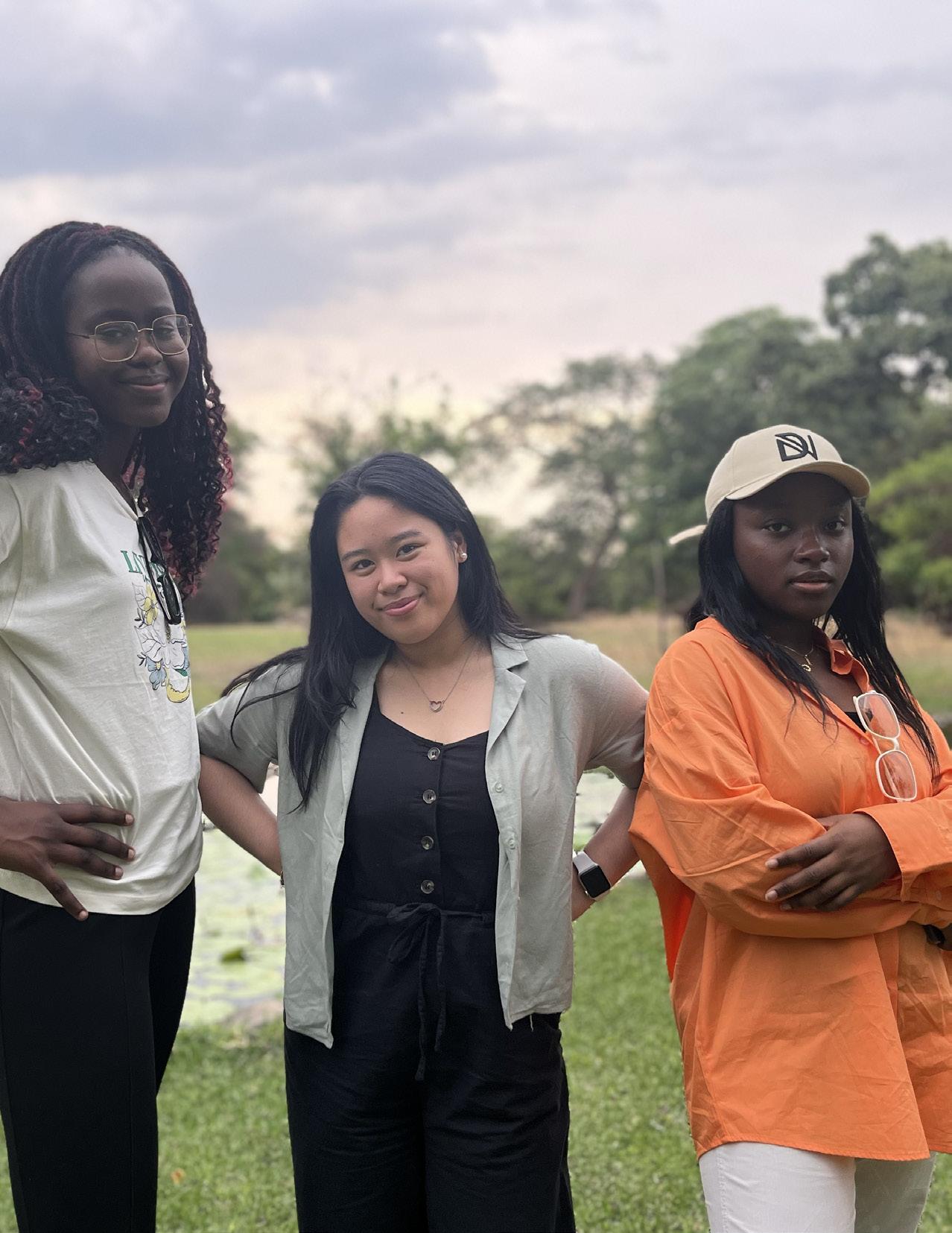
From left, Claudine,
were awarded the 2022 Science for Development Award. The girls were chosen by the competition adjudicators as winners for a project that refrigerated food without requiring electricity.
As the health threat posed by the pandemic receded, in-person workshops resumed for the Development Education team.
Self Help Africa’s Development Education programme remained online for the first half of 2022, returning on a phased basis to in-person workshops in the final months of spring, and to full-time in person workshops at the start of the 2022-23 academic year.
The programme delivered workshops in post-primary schools and to marginalised young people through Youthreach Centres at a number of locations.
trophy for the competition.
This competition attracted more than 60 student entries, and led to the creation of a prize-winner’s trophy in 2023.
A competition to design a new perpetual trophy for the winners of the Irish Aid sponsored Science for Development Award attracted more than 60 entries.
Self Help Africa participated in the second successive online BT Young Scientist & Technology Exhibition in Dublin in January 2022. The Science for Development Award was won in 2022 by three fifth-year students from Co. Louth, with a project that refrigerated food without electricity.
The three teenagers, Jona, Claudine and Iman, were the 17th annual winners of the Irish Aid-sponsored prize.
More than a dozen science projects were presented at a subsequent Science for Development Showcase, hosted by the-then Minister of State with responsibility for Overseas Development Aid and Diaspora, Colm Brophy at Iveagh House, the headquarters of the Department of Foreign Affairs.
Self Help Africa subsequently hosted a series of four student and teacher webinars to promote the Science for Development Award, and launched a competition with post-primary art students, to design a new perpetual
During 2022 the Development Education team also participated in a number of annual public events, including the Elements of Change Festival at Cloughjordan Eco Village in Co. Tipperary, Electric Picnic Music Festival, the National Ploughing Championships, and in a World Food Day youth event in Galway.
A number of new teaching resources were launched, including a new resource that focussed on the environmental impacts of fashion and the clothing industry.
This was launched as a schools resource during the 2022-23 academic year, and was made available alongside Self Help Africa’s other schools resources at the Department of Education’s teachers portal, ScoilNet, DevelopmentEducation.ie, and from the Educator Hub at the BT Young Scientist and Technology website.
Self Help Africa is a member of Irish Development Education Association (IDEA) sectoral working groups for formal education, adult education and quality and impact. The organisation is also represented on the Dóchas Development Education group, and is a member of the DevelopmentEducation.ie consortium.
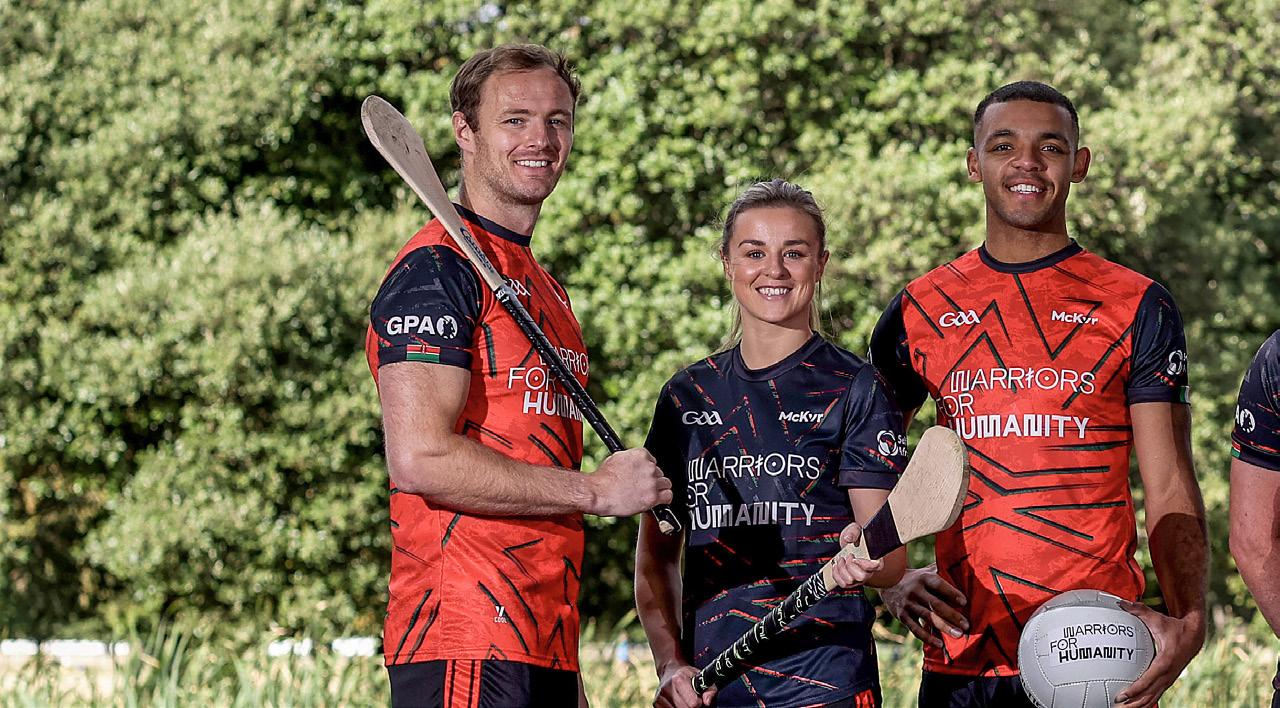
A
major new event in both Ireland and Kenya has attracted significant media attention and raised valuable fundraising income.
Self Help Africa’s flagship fundraising event of 2022 saw 50 leading stars of Gaelic Games raise nearly €500,000, when they made a trip to Kenya to take part in an historic first GAA showcase in Nairobi.
Well-known competitors from across Ireland made the week-long visit, during which they staged the first mixed inter-county games for men and women in Africa, and supported an initiative that has planted hundreds of thousands of trees in Kenya.
On the Plant the Planet Games trip in November 2022 were well known GAA stars, including Limerick hurler Sean Finn, Wexford’s Matthew O’Hanlon, Kerry’s Stefan Okunbor, Clare’s Podge Collins, Kilkenny’s Grace Walsh and Niamh O’Sullivan from Meath. Alongside their sporting exploits, they took part in a series of tree planting activities and visited Self Help Africa development projects and work being carried out in Kenya.
The inaugural Plant the Planet Games – a showcase of Ireland’s national games – were played at Nairobi Rugby Club and were attended by dignitaries including Ireland’s thenAmbassador to Kenya, Fionnuala Quinlan; Kenya’s world record holding athlete David Rudisha, his legendary Irish coach, Brother Colm O’Connell, and by representatives of the Irish community in Kenya.
The initiative has been shortlisted as a finalist for the Fundraising Campaign of the Year for 2023.
The Plant the Planet Games trip was backed by the Gaelic Players’ Association, whose CEO Tom Parsons was
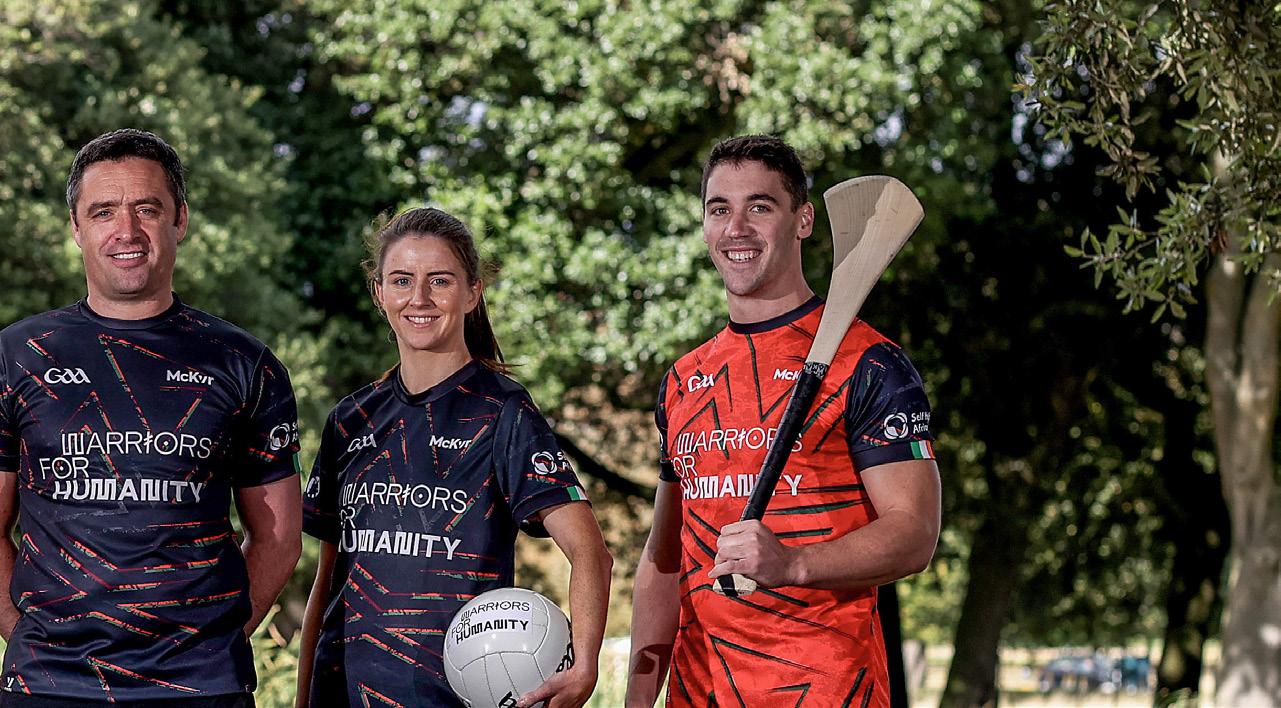
among the players who travelled. The initiative has been shortlisted by the Charities Institute of Ireland as a Fundraising Campaign of the Year. The games were the brainchild of former Galway dual player Alan Kerins, who has supported the activities of Self Help Africa through his Warriors for Humanity programme, for the past decade.
In the UK, our 2022 fundraising activities included a national BBC Radio 4 Charity Appeal that was presented by broadcaster and environmentalist, Liz Bonnin. In the US, it was back to in-person fundraising activities when the popular New York ChangeMaker’s Ball returned to Manhattan, raising more than €250,000 to support our work.
Self Help Africa was also supported in 2022 by the Limerick-based Kirby Engineering Group, who raised over €420,000 with an incredible two-day cycle event for their staff.
The ‘Kirby Way Cycle 2022’ raised funds for both Self Help Africa and the National Breast Cancer Resarch Institute. It was the biggest most successful fundraising event ever held to support our work.
The event, which took place in September 2022, saw 180 cyclists take to the road for a weekend cycle rally.
Competitors cycled along a route from Limerick to Galway, with many of those involved then embarking

on a second stage of their charity rally, onwards to Dublin - a total distance of approximately 300km.
A team of 23 volunteers, including Kirby employees, family members, supply chain partners and clients supported the event.
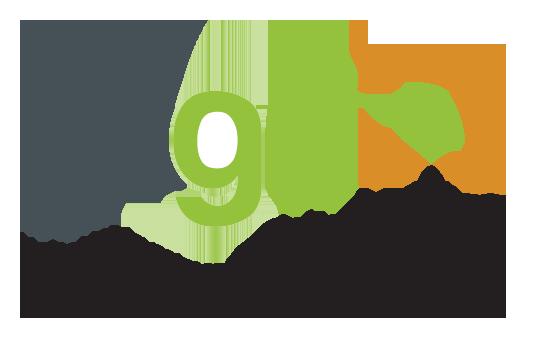
The AgriFI Kenya Challenge Fund continued to improve the capacity and climate-smart practices of Kenya’s smallholder farmers and pastoralists during 2022.
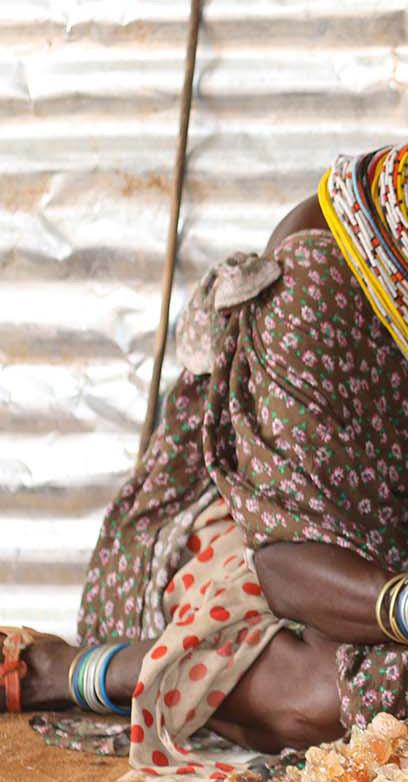
2022 was a year in which targets for the European Union initiative were exceeded and momentum continued to build, as the world slowly emerged from the COVID-19 pandemic.
Nairobi
By the end of 2022, AgriFI Kenya had integrated 166,548 farmers and pastoralists into inclusive value chains – surpassing its initial 100,000 farmer target. This meant around 120,000 smallholder farmers had directly benefited from better access to markets, farming supplies, credit facilities and training.
Funds also continued to be distributed, bringing the AgriFI Challenge Fund’s grant facility commitment to
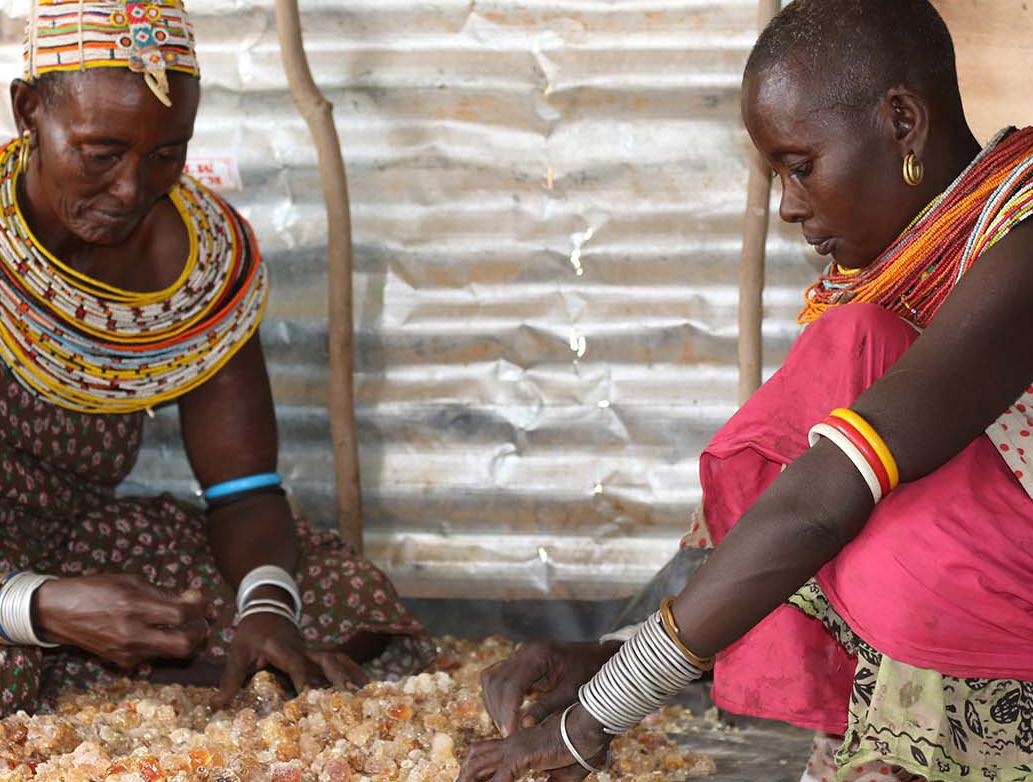
nearly €18.3 million, with more than €12.2 million also distributed to private sector investment in agricultural services and processing companies in Kenya.
This investment provided support services and resources to smallholder farmers and pastoralists in 45 counties, enabling them to improve their livelihoods, unlock the value of their products and drive sustainable growth.
A mid-term review found integrated farmers’ income had increased by 11 per cent and the food security of the smallholder farmer households we worked with had improved, with more than 90 per cent having an
acceptable food consumption score.
The Fund also continued to improve farmers’ productivity and climate resilience, having lent support to 146,000 smallholder farmers and pastoralists in total by year-end. This has accelerated smallholder transition to commercial agriculture and livestock production, increasing and diversifying their income on a sustainable basis.
By the end of 2022, farmers and pastoralists had cumulatively adopted climate-smart agricultural practices on 34,000 hectares of land.

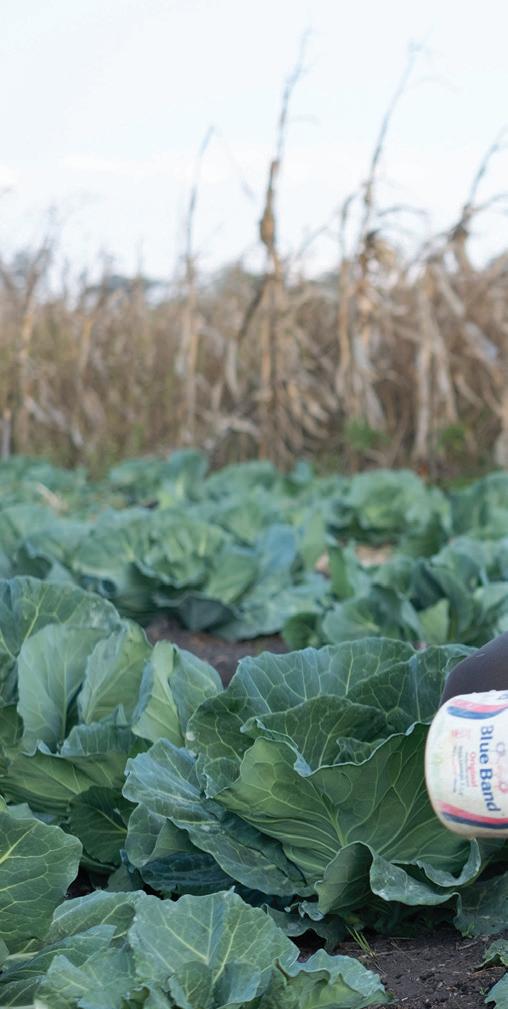
ENTERPRISE Zambia continued to unlock green and inclusive growth in agribusiness, agroforestry and aquaculture.
ENTERPRISE Zambia launched its fourth call for funding proposals for its challenge fund in 2022, taking to a total of €6.1m the sum that had been disbursed since the project was launched in 2020.
A mid-range review of the challenge fund forecast that ENTERPRISE Zambia companies would create 4,000 full-time jobs and directly and indirectly benefit up to 250,000 people in small-scale farming households.

By year end, funding had been disbursed to a total of 26 companies across an array of agricultural value
chains, including cotton, seed and inputs, livestock and tannery, aquaculture, farm equipment, maize and soya, forestry and warehousing.
The review acknowledged companies were continuing to adapt to and recover from the effects of the COVID-19 pandemic on their plans and operations.
The third and fourth call had focused attention specifically towards smaller, Zambian-owned companies, and had adjusted grant award sizes to engage with a broader cross-section of businesses in agri-business value chains.
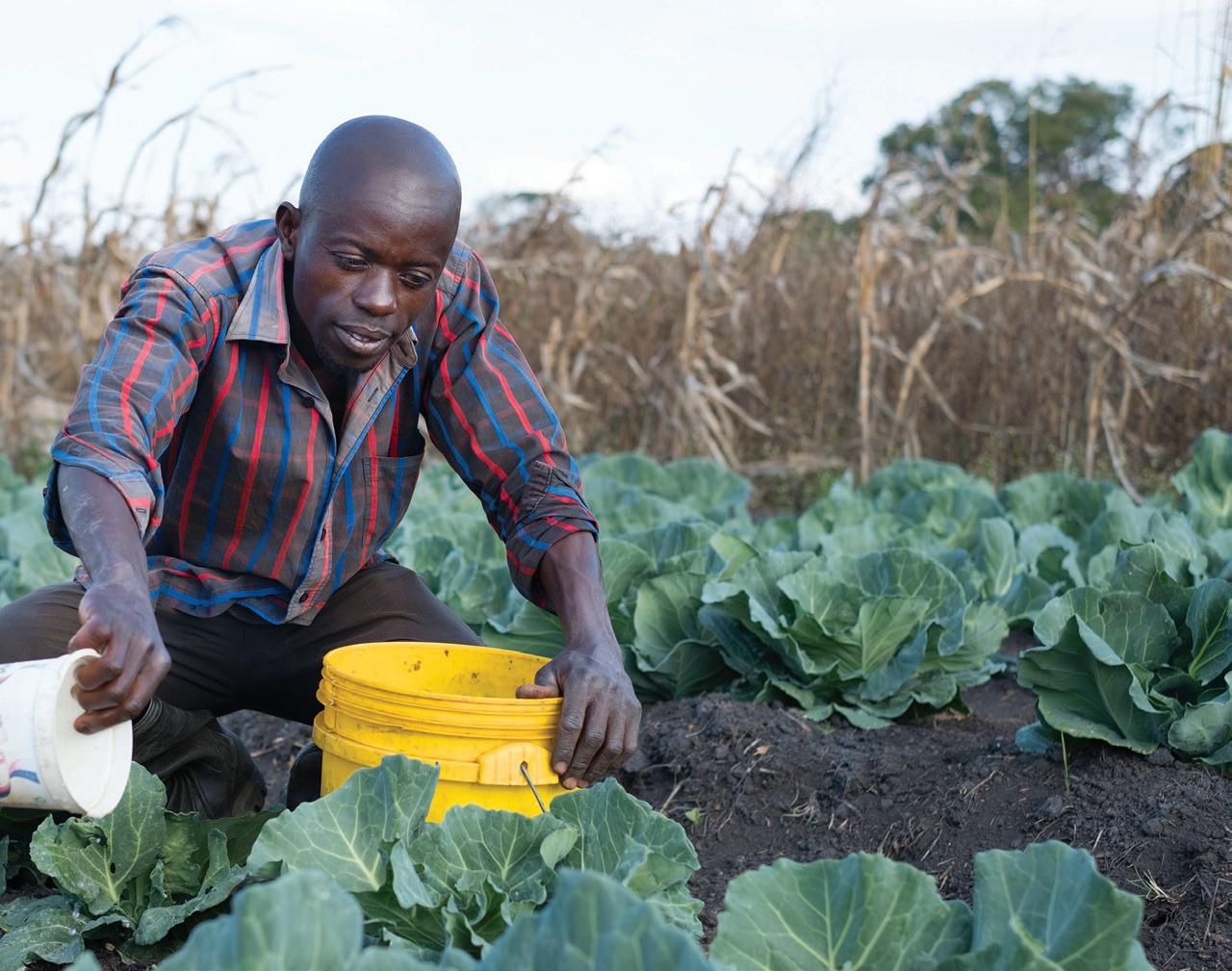
By year end, funding had been disbursed to a total of 26 companies across an array of agricultural value chains.
Self Help Africa trading subsidiary TruTrade sourced and traded more than 827 metric tonnes of produce on behalf of small-holder farmers in Kenya, in 2022.
TruTrade successfully collaborated with Unilever Kenya Ltd to source 169 tonnes of finger millet from smallholder farmers under a sourcing as a service contract with Unilever. TruTrade was responsible for the aggregation of the finger millet through a farmer service centre network, in partnership with the Cereal Growers Association.
TruTrade completed the two-year Women in Trade project, funded by TradeMark Africa, with a focus on reducing gender barriers to productivity, strengthening market access opportunities, and improving the skills capacity for women-led and women-owned small- and medium-sized enterprises and micro, small and medium-sized

enterprises in the agricultural sector. This project enabled women aggregators to register and trade with 2,138 producers – of whom 1,065 were women and 1,073 men. From these producers, 580,739 metric tonnes of mixed produce – ranging from avocado and mango to soyabean, sorghum and finger millet – was aggregated, and earned producers the equivalent of €147,000 in Kenyan shillings.
A significant restructuring of TruTrade’s operational model was undertaken during 2022 due to reduced available funding. TruTrade maintained the blended sourcing model to service larger local purchase orders from clients within a specified time frame. Across its portfolio of activities, TruTrade’s cost per deal has reduced marginally, thanks to a combination of improved sourcing efficiency, strategic partnerships, volume buyers and its blended sourcing model.
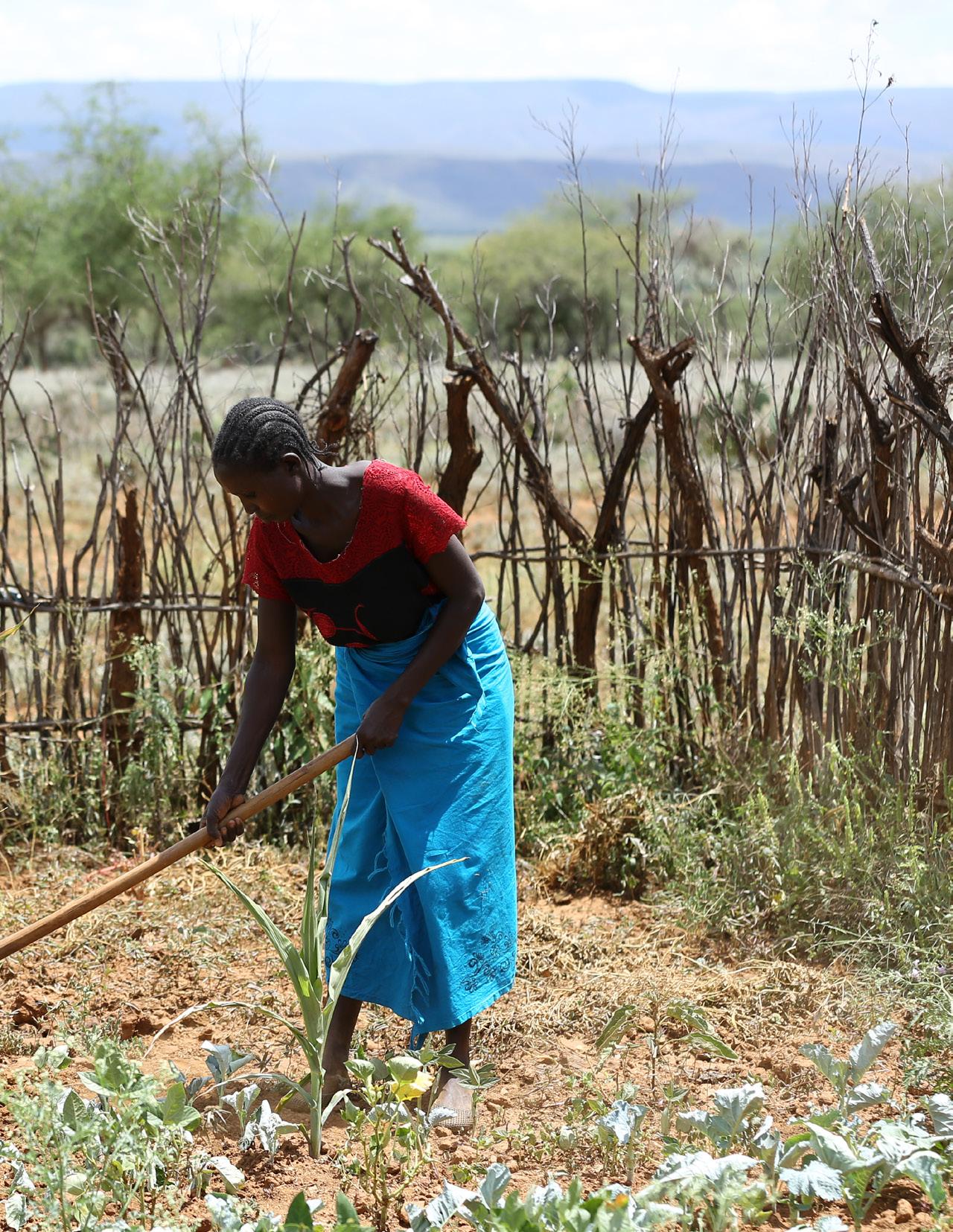
HOUSEHOLDS WITH INCREASED ACCESS TO FINANCIAL SERVICES
461,269
The WorldWise Global Schools programme continued to open the minds of students across Ireland to global issues.
The WorldWise Global Schools (WWGS) programme maintained its success in delivering Global Citizenship Education (GCE) for the post-primary schools sector in Ireland during 2022.
The programme is fully funded by Irish Aid and is currently delivered by a consortium led by Self Help Africa, in collaboration with Concern and the City of Dublin ETB (CDETB) Curriculum Development Unit.
WWGS maintained a strong number and spread of post-primary schools accessing quality GCE through its programme in 2022. During the 2021-22 academic year, 492 schools engaged in GCE through the WWGS programme, meaning 68 per cent of post-primary schools engaged with the programme during that year, with support from the Self Help Africa-led consortium.
Schools engage with the WWGS programme in various ways. The 492 participating schools in 2022 included 300 who worked directly with the WWGS staff team and another 192 that were involved in WWGS-funded NGO and education network projects.
In 2022, WWGS continued to promote and implement quality standards and good practice approaches to GCE, including through its award-winning Global Passport framework. This framework has become a valuable tool within the Global Citizenship Education sector that is recognised locally and internationally. Another 58 schools were presented with the
The Global Passport framework has become a valuable tool locally and internationally.
Global Passport Award in April 2022, taking the total of schools holding the award during the academic year to 104. To ensure teachers maintain and boost their GCE knowledge and skills, and support their pupils as they continue their learning in this area, WWGS organised a range of Continuous Professional Development training and events for 1,176 teachers during the school year.
Formal written feedback on WWGS’ third submission to the Irish Development Education Association Code of Good Practice recognised the substantial body of good practice evidence it has amassed and its value not just to the Development Education sector but to the post-primary sector as a whole.
At the end of the year, the WWGS consortium engaged an external consultant to assist the development of a five year proposal plan for the next phase of the programme.
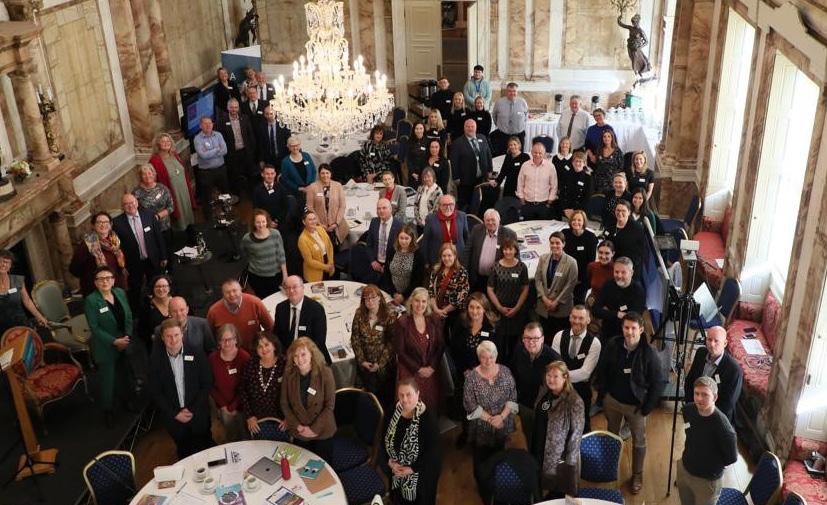
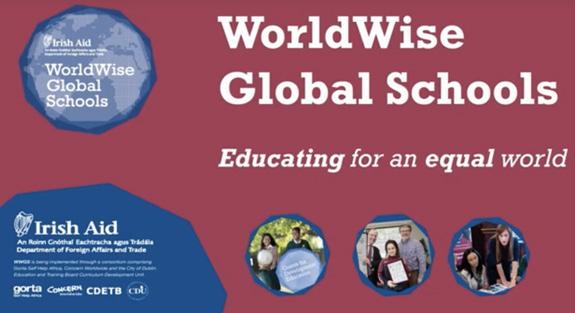

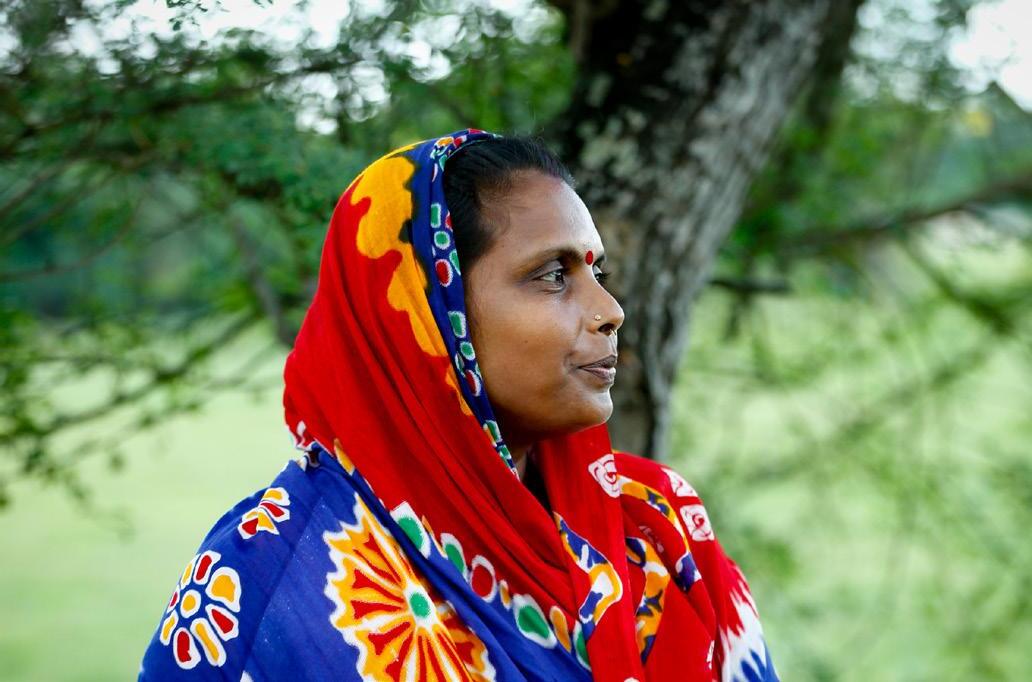
In 2022 Self Help Africa spent €44 million on 84 projects across Burkina Faso, Burundi, the Democratic Republic of the Congo, Eritrea, Ethiopia, The Gambia, Guinea, Kenya, Malawi, Mozambique, Nigeria, Senegal, Uganda and Zambia, as well as Brazil and Bangladesh.
We worked with smallholder farmers,
Bfarmer associations, cooperatives and agribusinesses to help farmers grow and sell more food, improve diets, diversify incomes and make their livelihoods more sustainable and resilient to external shocks.
While there were signs of a recovery from the worst impacts of COVID-19, macro-economic growth in target
angladesh made a rapid recovery from COVID-19 but faced political and economic challenges. Upcoming elections in 2023 led to an increasingly challenging political atmosphere.
There was also ongoing conflict in the Chittagong Hill Tract Region, alongside environmental disasters in 2022.
Natural disasters, particularly floods in the northern regions of Bangladesh
affected approximately 7.2 million people in June 2022. This led to a large-scale humanitarian response in which we were involved.
Five projects ended in Bangladesh during the year, including the GIZfunded project Mobilising rural women entrepreneurs for COVID-19 response and recovery. This model was being piloted in Kenya, Malawi and Nigeria. Six projects continued into 2023, the largest being the
Bandana, a leader in her local Women’s Business Centre, from Gongarampur, Khulna, Bangladesh.
countries was impacted by external and internal shocks, including the effects of the war in Ukraine on global commodity prices (including food, fertiliser and fuel), the disruption of global supply chains and adverse weather conditions. Soaring levels of inflation also negatively impacted households’ purchasing power.
EU-funded Leadership to Ensure Adequate Nutrition (LEAN) project, which was due to end in 2023.
Four new projects began in 2022, too. These included a Women’s Business Centres project funded by the Coca Cola Foundation, a project to strengthen civil society within Cox’s Bazar supported by IOM, and a climate bridge fund project to enhance resilience.

In northeastern Brazil we continued to deliver a Government-funded ‘Self-care alternative health pilot’ project, which offers alternative treatments to complement public health care services. The project was expanded to four health centres. Following the pilot, the Brazil team
began engaging Paraíba State government to discuss scaling the project. Funding was secured from Electric Aid and Be One Percent to support a menstrual health and income-generating project for women in five groups from early 2023. Emergency relief, including food parcels, was
Humanitarian needs in Burkina Faso remained significant in 2022. Nearly 1.9 million Burkinabè had been forced to flee their homes – a result of political instability and climate change. Violence had an impact on education, health, communications, and road infrastructure. Humanitarian access remained a challenge in large parts of the country.
Despite this, we continued to deliver the Women’s Economic Empower-
ment through Entrepreneurship in the Cashew Value Chain project, also known as DEFI, and SustInAfrica, a consortium research and advocacy project spanning 17 partners in multiple countries.
The DEFI-Cashew project, which closed at the end of 2022, surpassed its target by reaching 4,209 people, including 3,909 women and 300 men in cashew production. The project also included a beekeeping component, in which 235 people were
also distributed to 100 families (500 people), and productive groups and micro enterprises led by women and young people were supported with rainwater harvesting, bee keeping and honey materials, as well as solar panels, irrigation pumps and farming tools.
Nearly 1.9 million were forced to flee their homes.
trained and equipped for honey production. The EU-funded SustIn Africa, with Self Help Africa leading Work Package 5, primarily focused on screening innovations for their impact on gender, nutrition, and climate.

Self Help Africa has been assisting small and medium-sized enterprises to strengthen their exports capacity and facilitating market linkages for regional exports with the East Africa community for a number of years. We also work with local government institutions to strengthen operational export capacity and skills through
training, networking and coordinating sales missions.
The Burundi team delivered the Improve Information Sharing and Stakeholders’ Coordination on Cross-Border Trade for Women Traders in Burundi project, funded by TradeMark Africa. The project successfully supported more than 2,000 women in four provinces with access
to markets and formal cross-border trade. This increased traders’ incomes, as well as Burundi trade revenues, and supported COVID-19 recovery.
A tailored ‘MenEngage’, positive masculinity programme encouraged the women traders’ husbands and partners’ to support their work.
As part of its country programme, in 2022 Self Help Africa delivered the cross-border project on the Export Capacity Development Programme.
The project, which is similar to the one running in Burundi, was funded
by TradeMark Africa and forms part of Trade Mark Africa’s broader Market Linkages programme.
The project paired 20 small and medium-sized enterprises (10 in South Kivu and 10 in North Kivu) with 20 export advisors, who were trained in business mentorship and
on how to navigate border crossings and export regulations. By the end of the project, 19 SMEs reported having developed a good relationship with the DRC bureau of standard and quality control for their business product certification.
The context in Ethiopia continued to deteriorate in 2022, with projects impacted by drought and other climate-related crises, including flooding. Currency inflation and devaluation made procurement, recruitment and day-to-day activities more expensive.
Conflict and insecurity remained a key concern as different regions of the country became less stable –creating a complex environment for humanitarian organisations to operate within. Hundreds of thousands of people were displaced by violence and climate events across the country, requiring Self Help Africa to reori-
entate and adapt its programmes.
The Unleashing Productive Capacity through Graduation Approach project, funded by Irish Aid, was extended by a year and allocated an additional €200,000 to respond to communities affected by extreme weather and conflict. People who lost their harvest to extreme weather, such as flooding and drought, and those living in emergency displacement camps because of conflict, received cash assistance. The initiative was hugely successful and led to further funding from the Irish Emergency Alliance (IEA) and an emergency Self Help Africa fundraising appeal.
This funding supported the next response phase, which focused on communities in displacement camps. The camp populations had continued to grow during 2022, receiving little support as attention focused on the Tigray crisis. In late-2022, Ronan Scully, from Self Help Africa’s Fundraising team, visited the camps to raise awareness of this ‘forgotten crisis’ and meet with the communities.
The other Irish Aid project extended into 2022 was the MORE: MILK project, which aims to increase production through improved cattle breeds, resulting in higher incomes for farmers and improved food and nutrition security for the community. This
flagship project has increased access to improved cattle breeds in the target area. These cows can produce up to 600 per cent more milk than local cattle, they breed more offspring and they emit fewer greenhouse gases. The project has also helped professionalise the local dairy sector by providing farmers with training in business skills, marketing, and how

In 2022, Self Help Africa continued to support the Eritrean-Ireland Development Partnership led by Vita and contributed to the EU-funded seed project, which sought to develop sustainable community-based seed systems for potato and cereals. This project ended in 2022. Self Help Africa and Vita are hoping to continue working together in the seed sector.
Eritrea is now overseen by the Regional Director of the Horn of
to mobilise members for the dairy cooperatives. The community has also benefitted from milk availability, as well as clear messaging about the nutritional benefits of dairy, especially for children.
In 2022, Self Help Africa’s Ethiopia team also signed a contract with the World Food Programme to oversee a
€3.2 million project across four zones in Amhara, providing 54,000 people with support, training and access to financial services. A key element of project will be reducing climate risks through rehabilitation and management of watersheds.
Africa, Dinkneh Asfaw, who is also Country Director for Ethiopia. In late 2022, Dinkneh travelled to Eritrea with the Programme Coordinator for East and Horn of Africa to attend a potato conference hosted by the National Agricultural Research Institute (NARI). This was an opportunity to meet with partners and potential partners.
Self Help Africa also provides technical support to the Climate Smart
Agriculture Research and Innovation Support for Dairy Value Chains in Eritrea (CSARIDE) project, which began in early 2020.
In 2022 Robert Gensi, the Regional Agricultural Advisor, was able to provide support to the dairy project with a visit to Eritrea as well as organising multiple visits by Ministry of Agriculture/NARI staff to Uganda for the purpose of knowledge exchange.

Despite positive GDP growth, rising food prices undermined the pace of poverty reduction in The Gambia. The sharp increase in poverty was largely due to weaker growth in per capita GDP and high prices, which eroded the purchasing power of households.
The GIZ-funded project to strengthen marketing federations was launched in 2022. A member-based association was established to support production and marketing of vegetables cultivated by women farmers in the six regions of The Gambia. The project also built on the successful impact of an earlier biofortification project.
We continued our partnership with Waitrose Foundation as the implementation partner at Wealmoor Radville Farm. The UK supermarket’s Foundation works with its global supply chains to invest in farm workers and their communities with a range of social, environmental, health and economic projects, with an aim to improve livelihoods. The projects are designed with Worker Voice committees, who represent the farm workers.
The Gambia team continued the implementation of the three year, EU-funded West Africa Competitiveness Programme. Participants at 120 farmer field schools (95 per cent of whom were women) received training on climate-smart agriculture and
resilience, good agronomic practices, record keeping, financial management and negotiation skills. A new project to provide farmers with market prices for agricultural products and climate information was also launched.
In total, 3,234 farmers (2,729 female and 505 male) were reached by a biofortification and nutrition project. Farmers produced 67,790 orangeflesh sweet potato vines, which led to the production of 59 tonnes for consumption and marketing. A number of projects came to an end in December 2022. All co-financing requirements were met through Village Aid, FORSA, and Dublin City Council.
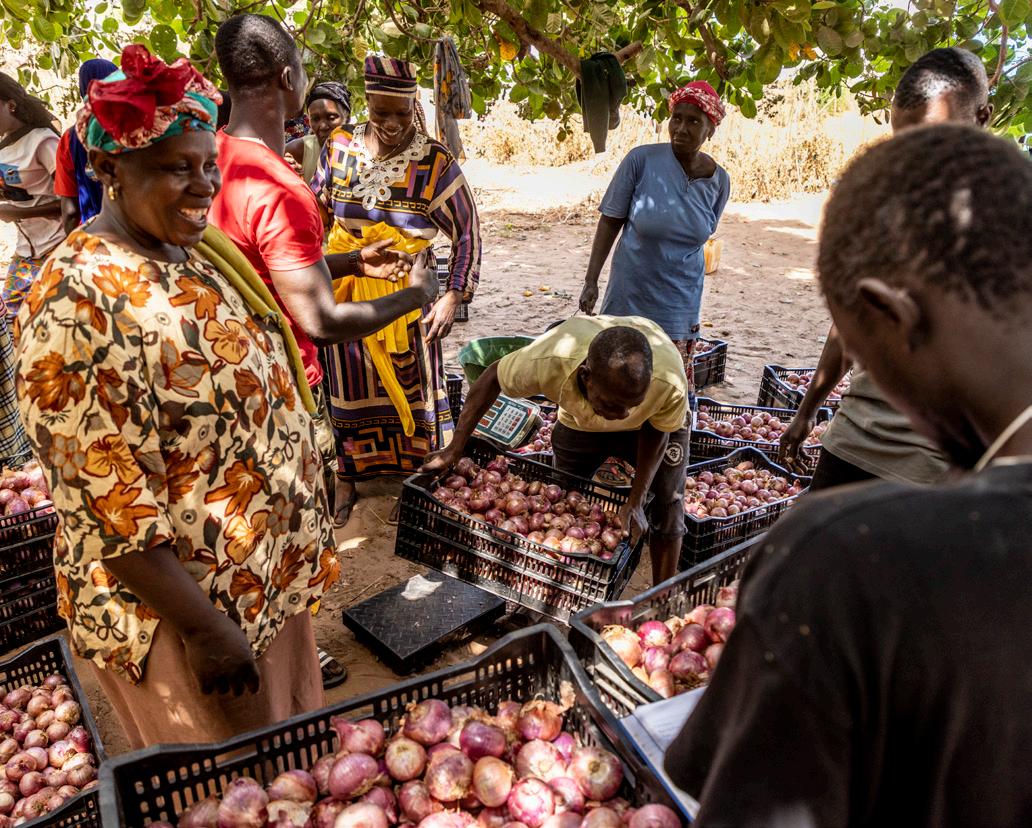
The Enabel-funded INTEGRA programme continued promoting local and inclusive development. It also contributed to the prevention and limitation of irregular migration, fostered the reintegration of return migrants, and the sustainable socio-professional integration of young people in Guinea. It did so in collaboration with GTZ, Germany’s Development Cooperation Programme, Enabel, the United Nations Development Programme (UNDP)
Kenya’s economy increased by 6 per cent in the first half of 2022, though this recovery was dampened by global commodity price shocks, the long regional drought and uncertainty in the run up to the 2022 general elections. The ongoing drought and a rise in the cost of living affected households throughout the country. Most reported a rise in essential food prices, with many unable to access staples. In response to inflationary pressures, the Central Bank of Kenya raised the policy rate three times from May 2022 to reach 8.75 per cent.
Throughout the year, a lack of rain affected most of the country, with the Arid and Semi-Arid Lands (ASAL) worst affected by drought. The lack of pasture and water saw livestock conditions deteriorate, limiting household income. Below average crop production meant there was less food, casual labour opportunities, and farmer purchasing power. House-
and the UN Capital Development Fund (UNCDF).
The INTEGRA programme aims to reach 4,736 young people through the INTEGRA functional literacy and economic integration programme, and to provide training, support and certification to 2,460 young people. By 2022, 37 training centres were set up, enabling 3,406 young people to receive literacy training and 2,460 young people to develop business plans.
The INTEGRA programme promoted local and inclusive development in Guinea in 2022.
holds struggled to meet their dietary needs and were often reliant on market food, further driving up prices.
Three of our projects were in the ASAL areas: the EU-funded Baringo Resilience Initiative: Nurturing Greater Opportunity and the two Global EverGreening Alliance (GEA) projects. The EU Resilience project started late, due in part to poor rainfall. A 12-month extension period to complete activities was requested in 2022 and granted in 2023. The two GEA projects have large tree planting components, which have been impacted by a lack of rain. Self Help Africa’s Kenya team adapted by focusing on farmer-managed regeneration activities and redirected some funds to increase water access by equipping boreholes for the Baringo project.
The EU also granted an extension for the Strengthening the Competitiveness of Cassava Value Chain project, which will now run until the end of October 2023.
An extension to the AgriFI Challenge Fund project was also requested to allow more time to work with companies and release additional grants to high performers. By 2022, the fund had supported the Agri enterprises to integrate 166,548 smallholder farmers and pastoralists into 14 inclusive value chains, surpassing the original target of 100,000 smallholder farmers. As a result, they will benefit directly from better access to markets, input supplies, credit facilities and climate-smart agriculture training sessions.
Towards the end of 2022, Self Help Africa launched its first Gaelic Athletic Association (GAA) fundraising trip. Around 50 GAA athletes from Ireland raised €10,000 each before travelling to Kenya as part of our organisation’s One Million Trees campaign.
In 2022, Malawi ran 20 programmes aimed at enhancing and improving sustainable access to water, sanitation and hygiene (WASH); nutrition; energy; livelihoods; and agriculture services. Self Help Africa also continued to support the Government of Malawi in emergency response, particularly during Cyclone Ana.
The Sustainable Production, Economic growth, Accountability and Resilience project (SPEAR for short) was extended for a year. The SPEAR project serves as the foundation for the next cycle of funding from Irish Aid, which was due to launch mid2023. Seventy four grain banks with 13,685 members (more than half of whom were women) were organised
into nine productive groups, at least half of whom were linked to cooperatives. More than 6,000 community members accessed grain loans during the lean season, which amounted to 7,088 bags of 50kg maize each.
The Sustainable, Accountable and Gender-Responsive Sanitation, Hygiene and Menstrual Hygiene Services for a Healthy Learning Environment for Adolescent Girls and Boys in Schools (SHASHA) project concluded. With UNICEF support, 15 schools in the SHASHA project completed works to include disability-inclusive features and a changing room for better menstrual hygiene management.
Elsewhere, we supported UNICEF to roll out cholera prevention activities
In Mozambique in 2022, United Purpose/Self Help Africa, launched seven projects. One of these was the third phase of the Government’s multisectoral Transparent Governance for Water, Sanitation and Health programme (or GoTAS III, for short). Funded by SDC (Swiss Agency for Development and Cooperation) and implemented in partnership with The Netherlands Development Organisation, SNV, it aims to improve the health of 360,000 women and men living in rural areas of seven districts in Niassa Province through governance, water supply, sanitation and health promotion.
The Mozambique team is also implementing a regional project, funded by Action on Poverty and the Australian Government, that is focused on improving farmers’ access to high
quality seeds, training sessions and markets in Ethiopia, Malawi and Mozambique.
Medicor Foundation funded a WASH services project for schools in Lichinga District in Mozambique, while UNDP is supporting an initiative seeking to decentralise development initiatives in Niassa and Nampula.
Global Affairs Canada (GAC) is supporting She Belongs in School, being implemented in partnership with Save the Children International (SCI), and the UNCDF supported a project to improve equitable development through citizen participation and social accountability.
The Embassy of Sweden provided funding for Transfer Efficient and resilient Agricultural Technologies through Market Systems (TEAMS),
in nine hard-hit districts. This programme complemented the COVID19 vaccine intervention that also launched in 2022. By rehabilitating and repairing boreholes, more than 14,200 people were able to access safe drinking water and sanitation.
The flagship five year EU-funded Bringing Extension Training Transforming Economic Returns (BETTER) programme ended in December 2022. A consortium project that was implemented with a number of partner agencies, BETTER reached nearly 381,000 smallholder farming households through 12,943 farmer field schools spread across 78 Extension Planning Areas.
which supported 40,500 farmers to access better agricultural inputs, and ended in December 2022.
The Improving Food Security, nutrition, income and livelihoods for smallholder farmers in Ethiopia, Malawi and Mozambique project was one of many to come from Self Help Africa/United Purpose’s longstanding relationship with Australian donor Action on Poverty. This project supported 842 smallholder farmers to improve food security, food safety and nutrition while promoting climate resilience. An important part of the project included promoting orange-fleshed sweet potato varieties as nutritious and marketable crops, supporting smallholders in demand-building exercises and cultivation. The success of this project led to it being renewed.
The economic situation in Nigeria deteriorated in 2022. According to the World Bank, up to five million more Nigerians were plunged into poverty during the year.
As Nigeria prepared for the 2023 general elections, political tensions heightened and the security situation worsened. High levels of violent crime by non-State actors persisted, affecting people across the country. An estimated 8,000 people were killed and thousands were kidnapped.
Humanitarian needs were high. Social and economic hardship linked to the COVID-19 pandemic combined with flooding – which caused displacement, loss of life and damage to farmland – exacerbated the already fragile food and nutrition security of Nigeria’s most vulnerable. This was further compounded by tighter constraints on humanitarian access, higher food prices, and supply chain disruptions linked to the conflict in Ukraine. At least one in two Nigerians (more than 100 million people) experienced moderate or higher levels of
food insecurity in 2022, according to the World Food Programme.
The Unicef-funded project Empowering community and youth started during 2022, which aimed to improve government, local government, and community capacity to provide services that promote child-centered approaches to service delivery, where every child has access to quality essential services. A series of community planning workshops were held during the year, and an enumeration exercise identified eligible children and families within the project area.
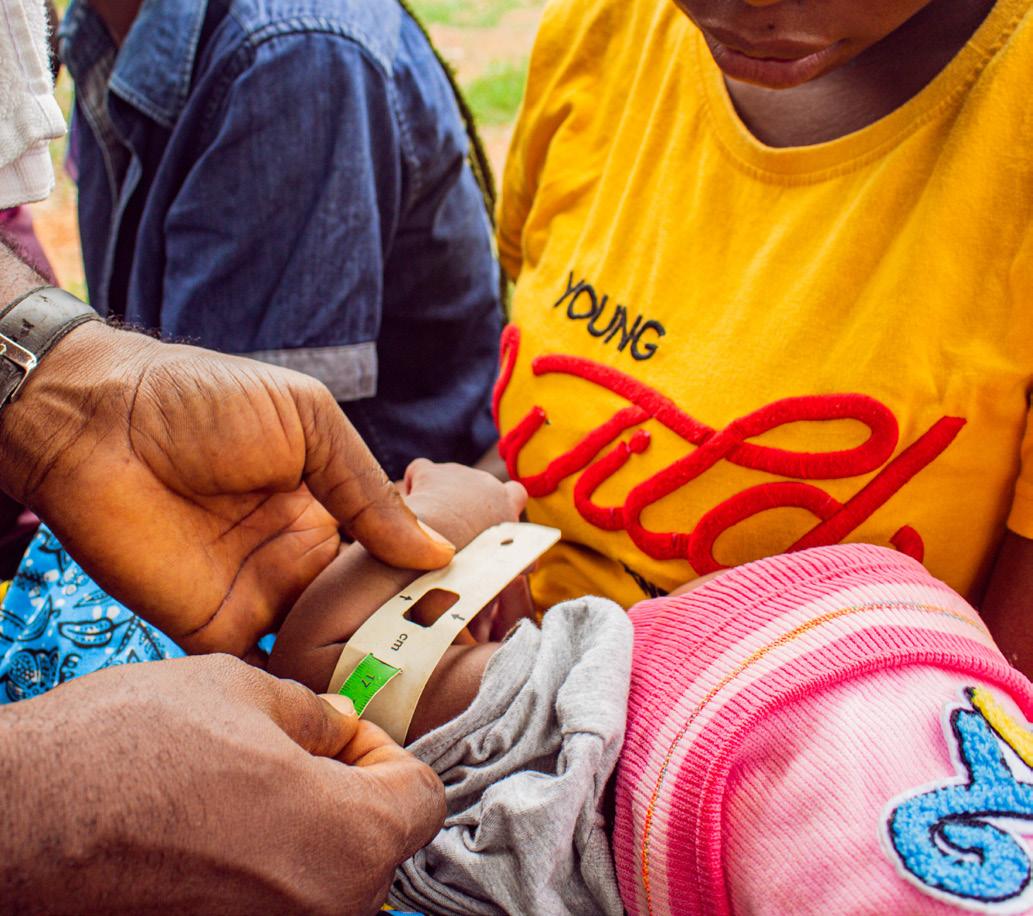
enegal is one of Africa’s most stable countries, with three peaceful political transitions since independence in 1960. While Senegal has so far been spared the violence engulfing the region, terrorist group activities in neighboring countries and cross-border trafficking risk fueled instability.
The COVID-19 pandemic and ongoing conflict in Ukraine reduced Senegal’s economic growth in 2022, with food and energy prices higher, trade disrupted, and less private investment. The pandemic significantly altered the country’s economic outlook, affecting tourism, transport and exports. Senegal has responded with several containment measures and has implemented an economic and social resilience programme but limited fiscal buffers and safety nets, a vulnerable healthcare system, and a large informal sector pose challenges.
Despite numerous COVID-19 restrictions, United Purpose/Self Help Africa continued delivering project activities and maintained a consistent team. Four new projects were contracted throughout the year. The EU-funded Gestion des Forêts de Mangrove du Sénégal au Benin project, which focuses on mangrove protection, restoration and management, created a national working group for mangrove ecosystem protection and the first cross-border mangrove ecosystem protection platform with representatives from Guinea, Guinea Bissau and Senegal. This project enabled the organisation to build its relationship with the International Union for Conservation of Nature, leading the project and becoming a key organisation in Senegal’s efforts to tackle climate change and marine conservation.
The third phase of the Koranic Schools project was also contracted and enabled us to build on our previous work with school children
and young people through better access to education. The project reduced child begging by 40 per cent and expanded our work on children’s rights to two new regions. At least 1,000 children benefited from a holistic package of education, health and vocational training.
As implementation partner for the Waitrose Foundation at three export farms in Senegal, United Purpose/Self Help Africa commenced building four classrooms in the village of N’guélakh Peulh to improve teaching and learning conditions for the children of workers. We also installed drinking water connections in schools in the villages of Khodental, Keur Sabakhaw Sarr and Mbayene, and started to create toilet blocks for each school, as well as tree planting to provide shade and improve the school environment. We began refurbishing and equipping a community health centre and providing solar lighting for the streets of the workers’ villages.
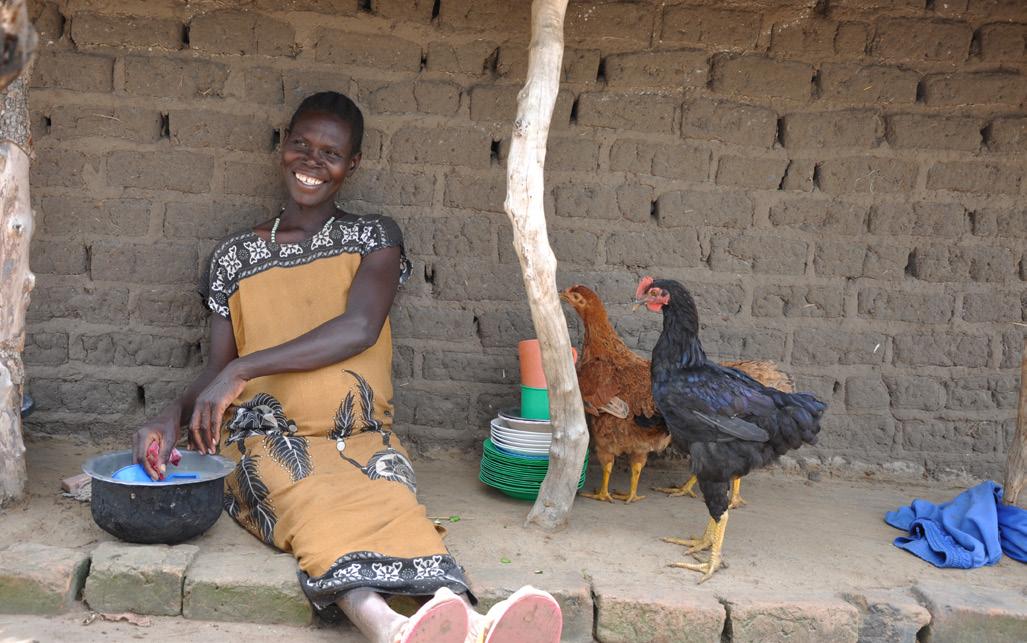
Economic recovery from the COVID-19 outbreak and lockdowns has been slow in Uganda. This, combined with below-average rainfall, has negatively affected household incomes at a time when food prices remain high. Northern Uganda continued to be affected by conflict and limited resources in 2022, which further restricted food access. In the west and southwest of the country, localised flooding and landslides damaged and destroyed crops. African Armyworm, a devastating crop pest, also remained a country-wide threat. At the beginning of 2022, Uganda hosted more than 1.5 million refugees. That population increased as the year progressed, with a further 130,000 people entering the country from South Sudan
Zambia shares its border with eight countries, expanding its regional market options for goods and services. It is also one of the world’s youngest countries by median age and its large youth population is anticipated to double in the next 25 years, placing additional pressure on demand for jobs, healthcare, and other social services.
In 2022, challenges in agriculture, mining and construction slowed the pace of post-pandemic recovery. Self Help Africa completed several longstanding projects in Zambia in 2022. The three-year PRESERVE Kafue project successfully concluded in December 2022. The project used a farmer-led extension approach to provide ‘last mile’ extension support to 3,651 people. These farmers were trained in community-based natural resources management, enterprise
and the Democratic Republic of the Congo. The Famine Early Warning Systems Network estimated more than 100,000 children and 12,000 pregnant and lactating women in Uganda’s refugee camps were malnourished between February 2022 and January 2023 (IPC, 2022).
Self Help Africa in Uganda received funding from the World Food Programme, a partner since 2018, to support refugee and host communities in Adjumani and Kiryondongo as part of the Agriculture Market Support project. Also in Adjumani, the Sustainable Livelihoods and Inclusive Markets for Refugees project, funded by Irish Aid, was given a one year extension that allowed us to reach more people with food security and livelihood activi-
ties. An evaluation in late 2022 was promising, finding a steady reduction in post-harvest losses and up to 90 per cent of farmers had adopted climate-smart agriculture practices after attending a project training session.
The Striking a Balance: Developing a Green Economy around Lake Bunyonyi project was also extended for 2022. The villages surrounding Lake Bunyonyi benefitted from five years of support and training in total that supported farmers to maximise their production, diversify their income and protect their farmland without negatively impacting the community’s natural resources. Self Help Africa hopes to build on this success with a follow-on project in the future.
development, savings, nutrition-sensitive agriculture, water, sanitation and hygiene, and gender equality. The project also sought to protect essential ecosystems along the Kafue sub-basin, which provide approximately half of the nation’s hydro-electric power, 44 per cent of Lusaka’s water supply, and nearly 90 per cent of sugarcane for domestic and export markets. The second phase of PRESERVE will run for five years from 2023 with Irish Aid funding.
The Zambia programme consolidated its strong and positive working relationship with the World Food Programme through several projects. The Farm to Market Alliance exceeded expectations, supporting thousands of farmers each month to access input supplies through farmer service centres, where products and services were sold. These farmers
were reached through training sessions and links to inputs. The farmer service centres sold ZMW 508,735 (approximately €25,000) that month, with most coming from the sale of seed, fertiliser and crop protection products. Its success exceeded expectations.
The EU-funded ENTERPRISE project saw €6.1 million disbursed to 26 companies in 2022. The project’s mid-term review confirmed evidence of positive outcomes for smallholders and firms was beginning to emerge. Companies are forecast to reach more than 250,000 smallholders and support more than 4,000 full-time equivalent jobs by the end of the project in 2025. Smaller, fully Zambian-owned companies will be the focus of the next phases.
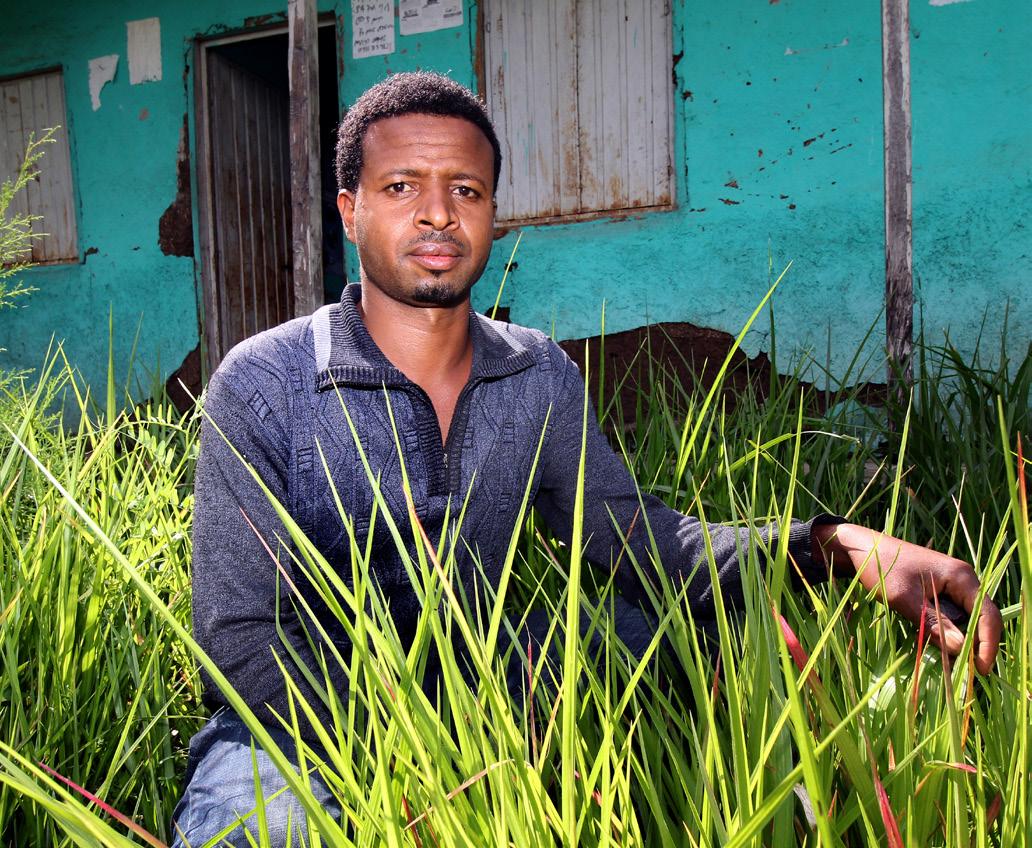
In Bangladesh, the EU-funded Leadership to Ensure Adequate Nutrition (LEAN) project continued to work on improving nutritional governance in Chittagong Hill Tracts through a multi-sector nutrition approach. LEAN has been working with central and local governments, facilitating nutrition coordination committees and building the capacity of line departments on nutrition-sensitive
and nutrition-specific interventions. The aim remained to support local and central authorities to include a nutrition budget in their annual plans to embed nutrition interventions in authorities’ activities. This has the potential to improve the nutritional status of millions of households in Bangladesh.

In Burkina Faso, as part of our policy influence strategy, Self Help Africa in Burkina Faso held a technical committee meeting that brought together stakeholders, including the national cashew union, members of decentralised governmental services, and extension services. The meeting provided an opportunity for the organisation to contribute to ideas that may boost the cashew sector, for example proposing more inclusive and sustainable policies by advocating the meaningful inclusion of women in the sector and piloting innovative approaches, the transformation of cashew apples into nutritive products, such as juice.
Self Help Africa participated in the cashew marketing campaign in Gaoua in March 2022, which was led by the Ministry of Agriculture and fixed the minimum price of cashew nuts for the year. The organisation also participated in a workshop organised by the Conseil Burkinabè de l’Anacarde (CBA, Burkina Faso National Council on Cashew) to validate reports and studies on the cashew price and its impact on the value chain. Self Help Africa was also invited to a feedback workshop on the draft national report on development cooperation, which was developed in 2021.
In Kenya, we remained intensively involved in the Flour Blending Initiative, which aims to contribute toward food security, improve nutrition and increase employment opportunities in Kenya through flour blending based on under-used, high-value foods such as cassava, millet, sorghum and sweet potato. The Kenyan State Department for Crop Development and Agricultural Research, with support from Self Help Africa Kenya and funding from the European Union, convened a series of intensive stakeholder consultative meetings in April 2022 with experts drawn from various sectors. Once the Flour Blending Regulation is passed, an increase in the production and consumption of crops used for blending wheat or
maize flour, such as cassava, millet and sorghum, is anticipated. Self Help Africa presented its work on root crops, such as cassava and sweet potatoes, at the 19th International Triennial Symposium of the International Society for Tropical Root Crops conference, which was held in Nairobi, Kenya in November 2022. The crops are important for the food and nutrition security of millions of households, but their production and transformation remain below potential. The conference was an opportunity to advocate strengthening the roots and tubers value chains to increase their competitiveness in our agri-food systems.
In Ethiopia, Self Help Africa remained actively engaged in revising existing agricultural and rural development policies and strategies, led by the Ministry of Agriculture. In 2022, Self Help Africa participated in formulating the national pluralistic agricultural extension policy, which will shape the provision of extension services in Ethiopia. The policy, once promulgated, will recognise the expertise that NGOs and the private sector bring to providing agricultural extension services.
Self Help Africa also contributed towards understanding policy and institutional implications for smallholder farmers in the dairy sector in Ethiopia through our research paper ‘Institutional and policy factors for transforming smallholder dairy farming towards a sustainable food system: evidence from MORE-milk project’ which was presented at Haramaya University.
In Ireland, Self Help Africa took part in the Irish Forum for International Agricultural Development’s (IFIAD) Irish Food Systems Network. This was an opportunity to share experience and reflections on implementing a food systems approach with other international NGOs. Self Help Africa was invited to an International Fund for Agricultural Development (IFAD)IFIAD round table discussion, where Self Help Africa shared its experiences, approaches and innovations within agriculture and sustainable food systems. The organisation’s experience was referenced by the Associate Vice-President of the External Relations and Governance Department of the International Fund for Agricultural Development in her presentation and in accompanying marketing materials.
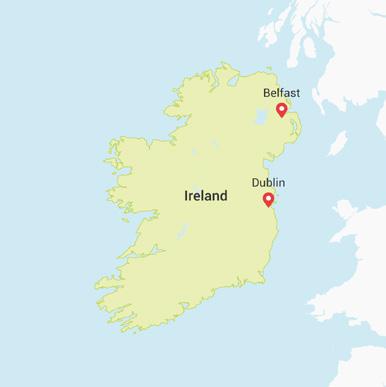
In Malawi, Self Help Africa was committed to promoting neglected and under-used crop species (NUS), such as millet and Bambara nut. In partnership with the Lilongwe University of Agriculture and Natural Resources, farmers were supported to multiply NUS seeds. The next step will be to get the seeds certified under the Quality Declared Seed (QDS) system by the seed services unit. This will help with the propagation and commercialisation of the NUS seeds, which will support farmers in their climate adaptation efforts, as well as their food and nutrition security. At
the national level, the project continued to push for the recognition of QDS for these local NUS varieties.
Self Help Africa, in partnership with Queen’s University Belfast, continues to promote the Targeted Selective Treatment approach among goat farmers and extension workers in Malawi. Efforts are underway to integrate this low-cost and effective approach into the agri culture extension policy in Malawi.
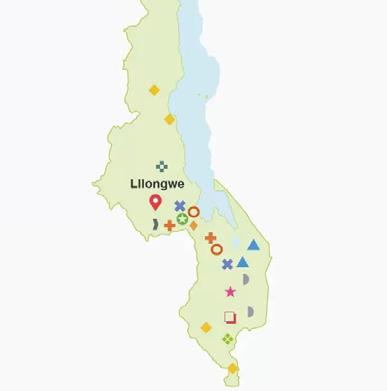
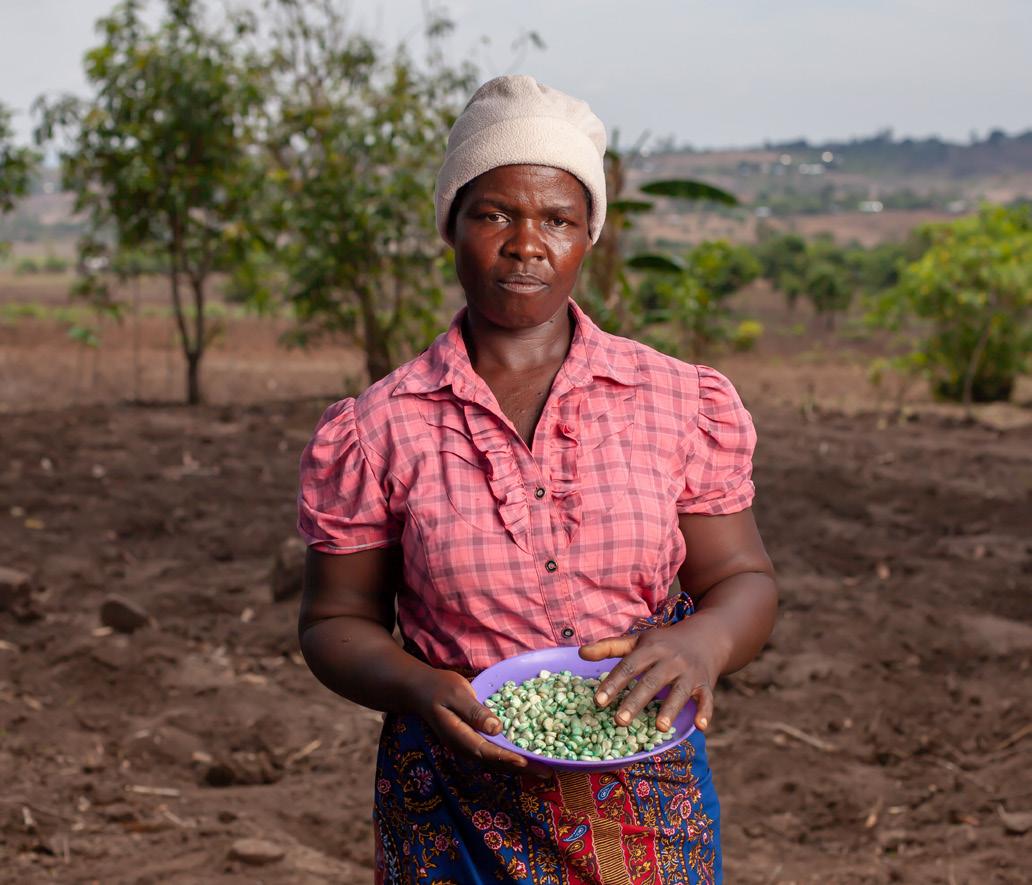
In Uganda, under the Teso Youth and Women’s Livelihoods Programme, Self Help Africa continued to support local democracy by helping local authorities to formulate by-laws, which were presented to and passed by the sub-county council. This will enable local authorities to enforce them, helping communities to manage and protect their natural resources as well as their crops.
Self Help Africa, in partnership with Partner Africa, furthered efforts to
improve the conditions of farmers in the honey value chain with the launch of the Responsible Business Conduct Guide for the honey and beeswax sector in Uganda.
The guide outlines good practice in relation to responsible business and human rights due diligence, providing practical advice and tools.
In Zambia, Self Help Africa continued to participate actively in the revision of the micro, small and medium-sized enterprise (MSME) policy as a member of the Technical Working Group on MSME. The work was halted during the pandemic and presidential election and was resumed with the creation of a Ministry of Small and Medium Enterprise Development to facilitate the creation and growth of small and medium enterprises to contribute to job creation. In 2022, we participated in the validation meeting of the revised MSME policy, supporting the incorporation of gender and inclusion considerations in the policy, as well as the inclusion of smallholder farmers and young people.
The Government also launched the Public Private Dialogue Forum (PPDF), which aims to promote economic growth and development through public-private partnerships in Zambia.
Self Help Africa was invited to sit on the PPDF technical working group and attended the first meeting on climate adaptation. Another forum, the Climate Smart Agriculture Alliance Zambia, conveyed a meeting where Self Help Africa shared its experience on climate-smart agriculture programming.
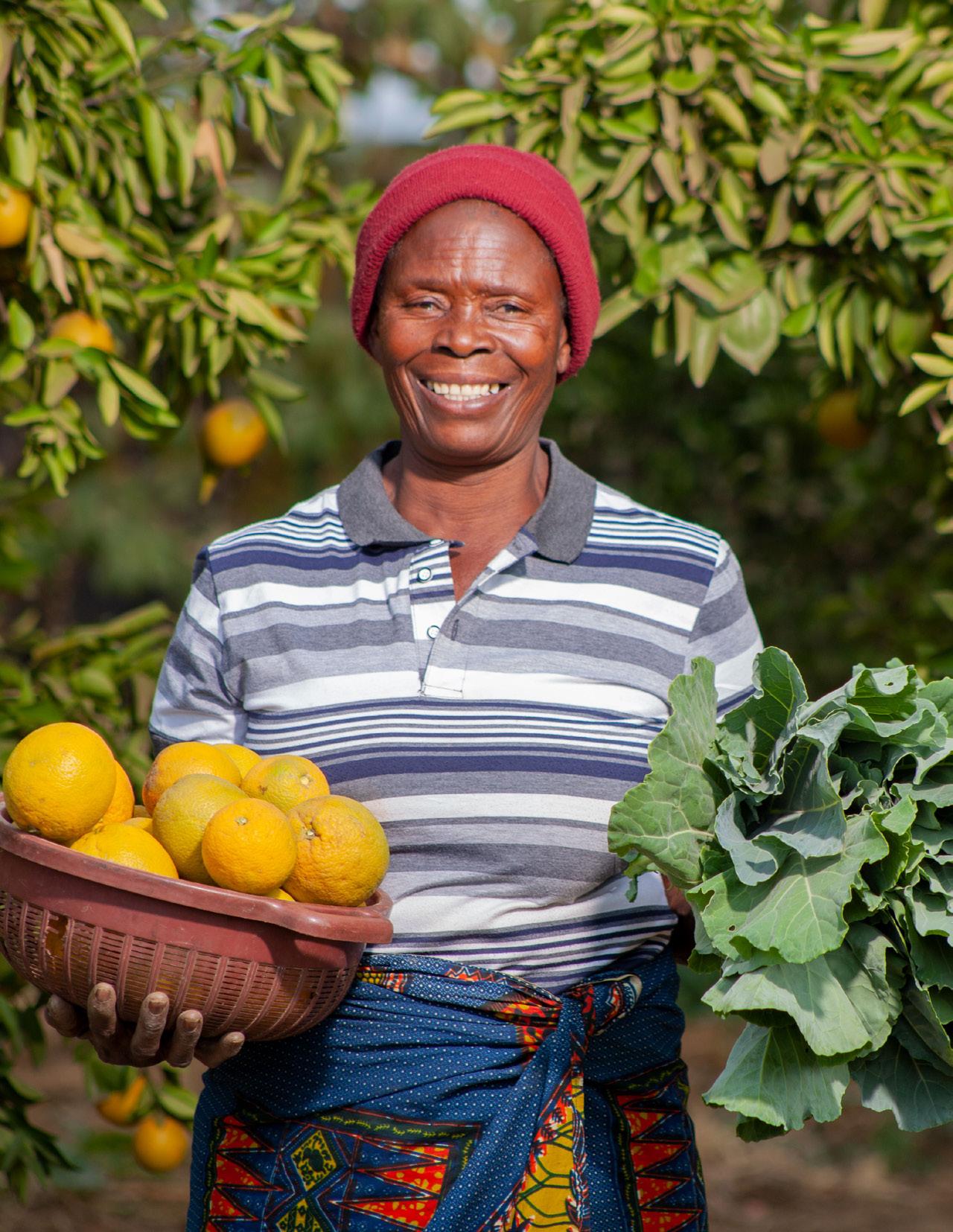
Self Help Africa continued to operate against the backdrop of a global pandemic throughout 2022.

by Geoff Meagher Chair, Self Help Africa
We know when we work together, we can make a positive difference.
I was proud to take the Chair role of Self Help Africa in February 2023, and am honoured to support the organisation in its efforts to end extreme poverty and improve the lives of some of the world’s poorest people. I recognise that this challenge is made more difficult by the disruptive effects of changing climate and ongoing conflicts in many parts of the world.
In Africa and beyond, we are supporting communities as they grapple with the significant threat to their lives and livelihoods posed by climate change. Although Africa is responsible for less than 10 per cent of global greenhouse gas emissions, more than 110 million people living on the continent were directly affected by weather, climate and water-related hazards in 2022.
These changes to climate had real and fatal consequences, as at least 5,000 people lost their lives to climate-related incidents, with nearly half of these deaths linked to drought (48 per cent) and 43 per cent associated with flooding.
These numbers make sobering reading and it’s easy to feel overwhelmed, but we know that when we work together, we can make a positive difference. We saw plenty of reasons to remain hopeful in 2022, based on the projects being delivered by our teams across the countries we operate in.
One of the ways we will achieve change for climate-affected communities in Africa is through strategic partnerships with like-minded organisations.
So, as members of the Global EverGreening Alliance, we were delighted when the Alliance secured its first tranche of funding in 2022, helping kick-start Restore Africa –an initiative to restore 1.9 million hectares of land and directly support 1.5 million smallholder farming families, across six African countries – Kenya, Ethiopia, Malawi, Tanzania, Uganda, and Zambia. We will be a proud partner in implementing some of this work in the years ahead.
Partnership was also the focus within our organisation, following the merger in late 2021 between Self Help Africa and United Purpose, an NGO with a similar mission and vision. The process to move forward as a united team continued apace in 2022.
We have had significant senior management changes in the organisation, including the appointment of a new CEO and financial director. The new team are working well with the introduction of additional experienced staff. The Board has been strengthened by the appointment of two individuals with significant commercial and governance experience.
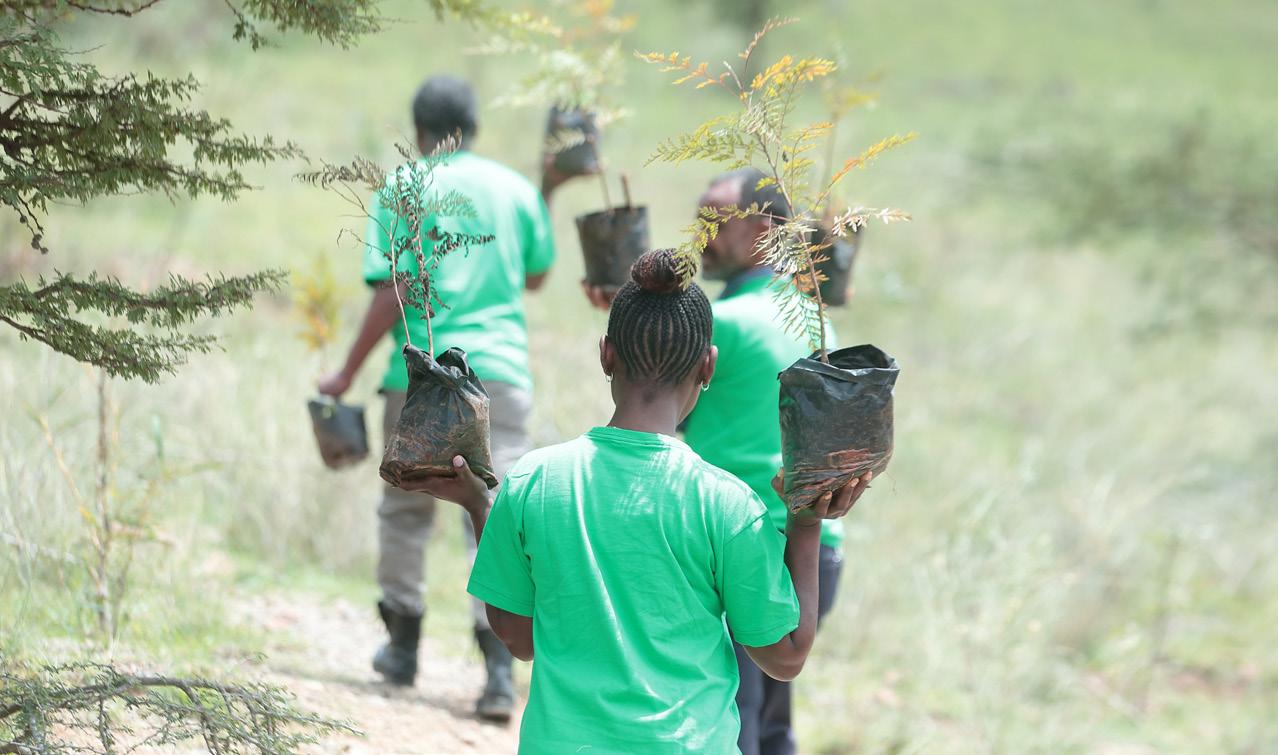
We are committed to ongoing excellence in operational efficiency and best in class governance practices.
This milestone merger between Self Help Africa and United Purpose has expanded our reach to new countries in Africa and brought new expertise to our joint organisation, making us stronger and more effective as we face the many challenges confronting disadvantaged communities worldwide.
There is a lot to be done as the world grapples with the impact of climate change, but we will keep prioritising the future wellbeing of those communities we work with and for, sharing our expertise in climate-resilient agriculture approaches to ensure families can protect themselves from shocks and increase their income.
I thank our staff at all levels for their commitment and dedication to our work throughout the year. There have been many difficult challenges to
overcome and these have been managed with enthusiasm and courage.
I thank my Board colleagues for their support and input throughout the year, including work within the various Board sub committees.
Thank you for your continued support and interest in our work. I especially acknowledge the ongoing support of our many donors – without you, none of this would be possible.

Geoff Meagher Chair, Self Help Africa
and Consolidated Financial Statements for the financial year ended 31 December 2022
BOARD OF DIRECTORS
Geoff Meagher (Chair)
Carmel Fox (Chair, resigned 28/02/2023)
Martin Ryan
Pat Murphy (resigned 28/02/2023)
Jim Galvin
Catherine Fitzgibbon
Sheila Walsh (resigned 28/06/2023)
Jim Kinsella
Joe Healy
Kalongo Chitengi
Hadi Husani
Chinyere Almona (appointed 29/09/2022)
Mary Robinson (appointed 28/02/2023)
Sinead Kilkelly (appointed 28/09/2023)
Ray Coyne (appointed 28/09/2023)
COMPANY SECRETARY
CHIEF EXECUTIVE OFFICER
REGISTERED OFFICE
Peter McDevitt (resigned 20/09/2022)
Pat Murphy (appointed 20/09/22), (retired 28/02/23)
Joe Healy (appointed 28/02/2023)
Ray Jordan (resigned 27/10/2022)
David Dalton (appointed as interim CEO on 27/10/2022)
Feargal O’Connell (appointed 17/04/2023)
4th Floor, Joyce’s Court, 38 Talbot Street, Dublin 1, D01 C861
COMPANY NUMBER 28228
CHARITIES REGULATORY AUTHORITY NUMBER 20008895
REVENUE NUMBER
SOLICITORS
PRINCIPAL BANKERS
AUDITORS
CHY 5678
Paul Foley Law 22 Northumberland Road
Ballsbridge
Dublin 4 Withers LLP. 16 Old Bailey London EC4M 7EG
England
Bank of Ireland
Lower Baggot Street
Dublin 2
Permanent TSB
2-4 Upper Baggot Street
Dublin 4
AIB
1-4 Lower Baggot Street
Dublin 2
Deloitte Ireland LLP
Chartered Accountants and Statutory Auditor Firm
Deloitte & Touche House
Earlsfort Terrace
Dublin 2
D02 AY28
The directors present herewith the reports and audited consolidated financial statements of the charity for the financial year ended 31 December 2022.
Gorta is the legal company name of ‘The Gorta Group’ which is a holding company for a group of organisations that cover a wide spectrum of activities in the international development sector. The organisation trades as Self Help Africa (SHA). We are an international non-governmental organisation whose main purpose is set out in our constitution as the assistance and advancement of people in need in less developed areas of the world. We have expertise in small-scale farming and growing family-farm businesses. We work with farmers and agricultural businesses in Africa to help them grow and sell more food, diversify their income and their diets, and make their livelihoods more sustainable and resistant to external shocks. We also respond to emergencies in support of the communities that we work with.
Our primary strategic objectives are to:
• Improve food, nutrition and income security for smallholder farmers.
• Support the establishment and growth of inclusive, profitable and sustainable agribusiness.
• Support the improvement of the policy environment for smallholder farmers.
Our new strategy to be implemented in the period 2023-2027 provides us with a road map to guide us in our work in the years ahead. It sets out our plans to alleviate hunger and poverty through economic and social change that creates sustainable livelihoods and healthy lives. This is underpinned by a commitment to localisation, and community-led and market-based approaches. We will seek to ensure people have access to safe nutritious food, water, decent
employment and incomes, without degrading their natural resources. We will do this from fragile contexts through to emerging economies. We will also seek to drive social change through policy and advocacy work that engages institutions and the wider public in our countries of operation and globally.
Self Help Africa works in Burkina Faso, the Democratic Republic of Congo, Eritrea, Ethiopia, Kenya, Malawi, Uganda, Togo and Zambia. This work was augmented in August 2021 when SHA merged with United Purpose (UP), an international non-governmental organisation with its HQ in Wales.
With a similar ethos to SHA, a locally-led approach is core to programme delivery with a strong focus on partnership with national and local government as well as community based organisations (CBOs) and non governmental organisations (NGOs). UP works in The Gambia, Guinea, Senegal, Nigeria, Mozambique, Malawi, Bangladesh and Brazil.
Gorta (trading as Self Help Africa) is the parent company of the organisation. Gorta is a company limited by guarantee and a registered charity in the Republic of Ireland. The other members of the Group are as follows:
• Self Help Africa UK is a registered charity with the Charity Commission for England and Wales under registration number 298830.
• Partner Africa is a registered charity with the Charity Commission for England and Wales under registration number 1144815.
• War on Want NI is a registered charity with the Charity Commission for Northern Ireland under registration number NIC 102154.
• TruTrade is a company limited by shares, registered in Kenya (registration number CPR/2012/74219).
• United Purpose is a registered charity with the Charity Commission for England and Wales under registration number 272465.
• Village Aid is a registered charity with the Charity Commission for England and Wales under registration number 1067322. It is intended to dissolve Village Aid in 2024 and transfer its assets and liabilities to Self Help Africa UK.
• CUMO Microfinance Limited is a registered company, limited by guarantee and incorporated in Malawi, under company registration number 8330.
• United Purpose Trading Limited is a registered company with Companies House, under company registration number 03020217. UPT was dissolved on 4 July 2023.
• Self Help Africa is a dormant company and a registered charity with the Charity Regulator in the Republic of Ireland under registration number 20012786.
Gorta was established as a legal charitable entity in the Republic of Ireland in 1965 and its governing document is the Memorandum and Articles of Association (most recently amended in July 2016).
The Board is committed to maintaining the highest standards of corporate governance and is happy to report that Self Help Africa complies with the Charities Regulatory Authority’s Governance Code. Over the last number of years, the organisation has put the systems and structures in place to ensure that we comply with this Code. As part of the pursuit of the highest standards in governance, an effective Board and a competent executive management team led by the CEO head the organisation. There is a clear distinction between the roles of the Board and the management
team to which day-to-day management is delegated. The management team prepares matters for consideration and approval by the Board e.g., annual budgets, policy papers. The Board then monitors their implementation. In this way, the Board creates a responsive, professional and sustainable group. The Board has reviewed our governance structures and has determined that we are compliant with the Code. In areas such as strategic planning, there is Board involvement at all stages of preparation and ultimate approval is the responsibility of the Board.
The Board met on seven occasions in 2022 (eight in 2021). Details of attendance at the Board meetings are set out below:
Catherine Fitzgibbon 6/7
Sheila Walsh 3/7
Jim Kinsella 6/7
Chinyere Almona 2/2 29/09/2022 29/09/2031
Joe Healy 6/7 7/10/2020 25/09/2029
Kalongo Chitengi 5/7 18/11/2020 18/11/2029
Geoff Meagher* 7/7 16/09/2021 16/09/2030
Hadi Husani 7/7 16/09/2021 16/09/2030
*Geoff Meagher was appointed Chair on 28 February 2023.
For the financial year ended 31 December 2022
Directors are elected from the membership of the organisation, with interested members putting themselves forward for election at the Annual General Meeting. As the Board is required to have a broad range of skills and experience, the Nominations Committee monitors succession planning for Board membership. It makes recommendations to the Board and membership regarding the recruitment of new directors who join the Board either via co-option (in the event of a vacancy arising and being filled between AGMs) or by being elected at the AGM proper. Directors co-opted between AGMs are required to put themselves forward for election at the following AGM.
New directors receive background and explanatory materials covering the nature and purpose of Self Help Africa to enable them to familiarise themselves with their duties and responsibilities, the Self Help Africa governance framework and its work overseas. Any relevant training requirements of directors are facilitated by the organisation.
SHA has been awarded ‘Triple Lock’ status by the Charities Institute Ireland (CII). Triple Lock status is awarded to charities that uphold the highest standards in transparent reporting, ethical fundraising and strong governance structures. This recognition is the gold standard for Irish charities to offer assurances to donors, members, supporters and the general public. To achieve the Triple Lock, we:
• Adopted and maintained compliance with the Guidelines for Charitable Organisations on Fundraising from the Public.
• Prepared our annual financial statements in compliance with the Charity SORP (Statement of Recommended Practice under FRS102) accounting standard and
• Adopted the Charities Governance Code as devised by the Charities Regulator.
As a signatory to the Dóchas Code of Conduct on Images and Messages, we reaffirm our commitment to best practice in the communication of images and messages in all our public-facing collateral and policy statements.
Audit, Finance and Risk Committee
The function of the Audit, Finance and Risk Committee is to review internal financial controls, treasury and risk management processes. It liaises with external auditors and reports directly to the Board. It meets on a regular basis to monitor and review the financial performance of the organisation, internal and external audit findings, management information systems and internal control systems. It provides independent oversight of the annual budgets, management and statutory accounts and makes recommendations to the Board where relevant.
The committee met 4 times in 2022 (6 times in 2021).
attended/eligible to attend
Geoff Meagher (Chair)* 4/4
Martin Ryan 3/4
Theresa Morrissey 1/4
Chris McDonald 3/4
Jenny Fisher 2/4
Chinyere Almona* 3/4
Dervla Owens 0/4
* Geoff Meagher resigned from the committee and Chinyere Almona was appointed Chair on 18 May 2023.
This committee oversees the quality and depth of programme performance in the food, nutrition and livelihoods element of the programmes function on behalf of the Board and provides advisory support for management on the development and delivery of such programmes.
In particular, it has the following delegated responsibilities:
• Ensure that all programming is delivered in line with organisational strategy, policy and governance standards.
• Ensure that an effective programme approval process is in place and applied.
• Ensure that an effective resultsbased management system is in place and applied.
• Support the development of country strategy papers, programme policies and programme approaches.
The committee met 4 times in 2022 (5 times in 2021).
Name Number attended/ eligible to attend
Pat Murphy 4/4
Jim Campbell 4/4
Catherine Fitzgibbon* 4/4
Nicholas Holden 1/4
Jim Kinsella 4/4
* Pat Murphy resigned as Chair and Catherine Fitzgibbon was appointed Chair on 28 February 2023.
The function of the Remuneration Committee is to devise and recommend remuneration policy to the Board for all Self Help Africa staff. The members of the committee are Pat Murphy (chair), Eimear Kenny and Valerie Sullivan.
The function of the Nominations Committee is to facilitate the ongoing process of Board renewal, making recommendations to the board and membership having identified skills gaps, and identifying members who would have the potential to fill such gaps. The Board actively encourages diversity in our governance structures. The members of the committee are Jim Kinsella (Chair), Tom Kitt, John Carroll, Carmel Fox.
The Fundraising and Communications Committee is a formal sub-committee of the Board, with delegated responsibilities for planning and oversight of fundraising strategy, trends and performance. The members of the committee are Joe Healy (Chair), Pat O’Keeffe, Jason O’Brien, Hugh Chaloner.
The directors have responsibility for and are aware of the risks associated with the operating activities of the Group. Risks are regularly discussed and reviewed at different levels of the group ensuring they are identified, managed and mitigated in line with the group policies and risk framework. The Board are confident that adequate systems of internal control are in place and that these controls provide reasonable assurance against such risks. Management prepares a risk register which is a consolidation of head office and country level risk reviews and is updated regularly and subject to detailed reviews by the Board. The principal risks and uncertainties have been identified as follows:
• Global Staff Wellbeing: This is the risk that staff experience excessive and unsustainable workloads, which leads to risk of burnout, health issues for staff and poor performance against organisational objectives. To help mitigate this risk, the Group Board has appointed a Head of People & Culture who will lead on a number of projects to address staffing issues. Wellbeing seminars for all staff are held regularly and over the coming years through an organisational restructuring, we will seek to ensure that resources are allocated appropriately to areas of most demand.
• Fraud & Corruption: This is the risk that a material fraud perpetrated by employees, partners or others may adversely affect our relationship with donors and other external stakeholders, or lead to reputational and financial damage. To help mitigate this risk, the group is putting in place a training programme for all country programmes. A confidential complaints mechanism is in place which allows staff and others to report on any concerns they may have which will then be fully investigated.
• Integration in a Newly Merged Organisation: Heavy workload, the enormity of the task of integration may fail to be understood, Insufficient communication, loss of information & knowledge, duplication of effort, wasted resources, leadership issues, employee resistance, IT integration and culture may impact the ability to successfully integrate all parts of the organisation. To help mitigate this risk the group has decided that no further mergers will be undertaken during this phase of the Strategic Plan to allow time & resources
31 December 2022
to fully integrate United Purpose into the group. Country plans are underway to review the applicable policies, local registrations, finance & other system standardisation across the organisation.
• Sustainable Finance: The risk that we fail to manage and secure the financial position sustainably. Given the volatility of income streams, increased inflation globally and external shocks there is an increased financial risk to the Group. To help mitigate this risk the organisation is reviewing its global structures in order to maximise the use of resources and maximise impact.
• Accountability & Governance: Poor governance and management practices may lead to inappropriate decision-making, lack of accountability, and ineffective execution of plans. A complex governance structure may not allow for the development of clearer synergies across the entities. We may not achieve a ‘one organisation’ approach with the highest standards of transparency, accountability, responsibility, and participation. A simplification of the Group structure is underway which will seek to fully merge entities within the organisation thus reducing the resources required to maintain the structure. The Group Board has restructured its committees in 2023 to include a new People & Culture and Governance & Nominations committee
We appreciate and acknowledge the role played by staff, based in Ireland, the UK, Africa, Asia and Latin America. The ongoing growth of the organisation’s work is due to their dedication and commitment. We are committed to the development of our staff and will continue to allocate resources annually towards training and devel-
opment programme. We are an equal opportunities employer, and we recognise the need to ensure we have high calibre staff and volunteers to achieve our vision and objectives. We strive to create a supportive environment in which all employees can flourish and reach their full potential, regardless of differences, experience or education. Harnessing the wide range of perspectives this diversity brings promotes innovation and helps make us more creative and enables us to better fulfil our organisation’s mission of supporting sustainable livelihoods and food and nutrition security for Africa’s smallholder farmers.
The Board of Directors delegates authority as appropriate to the Chief Executive Officer (CEO). The CEO appoints the other members of the senior management team. The Senior Management Team as of 31/12/2022 were as follows.
• David Dalton (Acting CEO)
• Orla Kilcullen (Programmes Director)
• Helena Skember (Regional Director)
• Colin Lee (Integration & Strategy Manager)
• Martha Hourican (Director of Business Development)
The key leadership of the group includes the trustees and the CEO, who manages the charity on a day-today basis. All trustees give their time freely and receive no fees or remuneration for serving as a trustee. The charity reimburses reasonable expenses incurred while acting as a trustee. This includes travel and accommodation expenses required to attend meetings, training and orientation. Every effort is made to ensure costs are modest. In deciding appropriate pay levels, Self
Help Africa aims to strike a balance between paying enough to recruit and keep skilled people and meeting the public’s and our donors’ expectations that the money they entrust with us is used wisely.
The establishment of a formal internal audit (IA) function in 2018 brought about the adoption of a SHA Internal Audit Charter which sets out the objectives of the function and the extent of its responsibility and authority. We have also adopted a SHA Internal Audit Framework with a standardised approach to audit, along with standard reporting tools and programmes. The audits focus on SHA’s internal control environment and incorporate a risk-based approach to internal audit planning. Financial information is subject to detailed review at director level allowing for continuous monitoring of Self Help Africa’s operations and financial status. A number of our field offices are subject to an annual audit by independent external auditors, in addition to periodic internal audit review.
We continue to implement our Safeguarding, and Protection against Sexual Exploitation and Abuse policies which are aligned with international best practice. Safeguarding is seen as a key governance priority. Often there can be unequal power dynamics or relations across an organisation and in relation to communities we work with. We face a risk that some staff (or others connected to SHA) may exploit their position of power for personal gain. Safeguarding is addressed throughout the organisation through the three pillars of prevention, reporting and response. Our policies are applied to SHA Boards, staff and subsidiaries, partners and affiliates, consultants, and contractors that supply services or
support to SHA. We strive to ensure compliance through training, terms and conditions for suppliers, a robust complaints response mechanism, whistleblowing channels and disciplinary measures up to and including dismissal and incorporation of the policy into partner agreements. A key element of this is in training, with workshops conducted at Head Office and all programme locations across Africa and addressing safeguarding as part of the induction process for new staff.
The Board has approved an updated Conflict of Interest Policy designed to ensure all potential or actual conflicts of interest are identified and addressed. The policy requires all employees including board, consultants, contractors, interns, secondees and volunteers that provide supplies, services or support to disclose potential or actual conflicts. The policy includes examples and scenarios to aid staff and stakeholders in understanding the standards applied. All employees are required to declare conflicts in recruitment, procurements or as and when a conflict or potential conflict arises. All new employees sign the Conflict of Interest Policy as part of their onboarding. All Board Meetings and Committee meetings have Conflict of Interest as a standing agenda item with any conflicts declared.
Self Help Africa is committed to managing and conducting its work activities in such a way as to ensure - so far as is reasonably practicablethe safety, health and welfare at work of its employees and volunteers. The Safety Statement, in accordance with Section 20 of the Safety, Health and Welfare at Work Act 2005 in Ireland, outlines the policy of Self Help Africa in relation to the management of
health, safety and welfare. Self Help Africa’s management continuously monitors compliance in line with legislative requirements. Our work on managing the impact of Covid-19 on our staff – following government guidance in all jurisdictions in which we operate, keeping staff fully briefed on best practice safety protocols, facilitating working from home for staff, granting flexible working time, holding meetings online, facilitating employee assistance programmes and training mental health first aiders to support staff on wellbeing and mental health issues as well as a range of other measures – is evidence of our commitment to, and the value we place on, our staff.
SHA and the wider Gorta group are committed to a carbon neutral future for our organisation. While our carbon consumption reduced significantly because of the various lockdowns and travel restrictions since 2020, we recognise that there are still areas for improvement. We need to ensure, post lockdown, that behaviours do not return to pre-pandemic times. We continue to plant trees and take other steps to mitigate the effects of the carbon that we are responsible for generating.
Volunteers play an important role in enabling us to achieve our goals. We are grateful to the boards of directors of all group companies, advisory sub-committees, the network of volunteers, and members across our retail and fundraising, who have been a source of great strength and resilience over the years.
the financial year ended 31 December 2022
In 2022 incoming resources for the Group (consolidated) were €46.7m (2021, €30.6m) with €47.6m of expenditure (2021, €34.1m); resulting in a net loss of €0.95m (2021, net expense of €3.5m). The significant increase in incoming resources resulted from the merger with United Purpose. Self Help Africa and United Purpose merged in August 2021; the 2022 financial year is the first full year of reporting for the merged entities.
The net impact of the above is a decrease in reserves of €0.65m during the 2022 Financial Year (2021, a reduction of €2.8m).
Income generated through Charitable Activities increased to 74% of total revenue. The EU is the largest donor to the Group with €15m in 2022 (€2.6m in 2021). Increased funding was also received from Irish Aid and a number of other donors. All other income streams increased in 2022 with the exception of Gifts in Kind. Gifts in Kind in 2021 resulted from the merger of United Purpose and the inclusion of the fair value estimate of United Purpose at the date of the merger in August 2021.
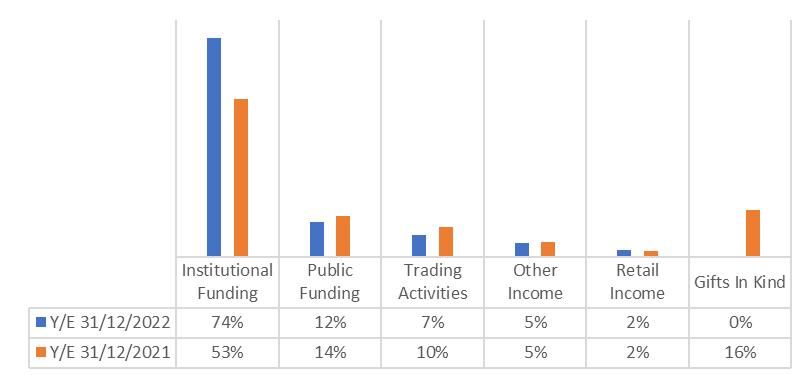
Expenditure on Charitable Activities of €45.3m is 95% of the total expenditure (2021:94%). Within Charitable Expenditure the largest spend is on the area of Livelihoods €13.6m, Agribusiness Development €9.6m, Agricultural Production €9.5m.
Expenditure on Charitable Activities of €45.3m (2021, €32.2) is 95% of the total expenditure (2021, 94%).
The following chart represents the Charitable Activities expenditure by programme area.
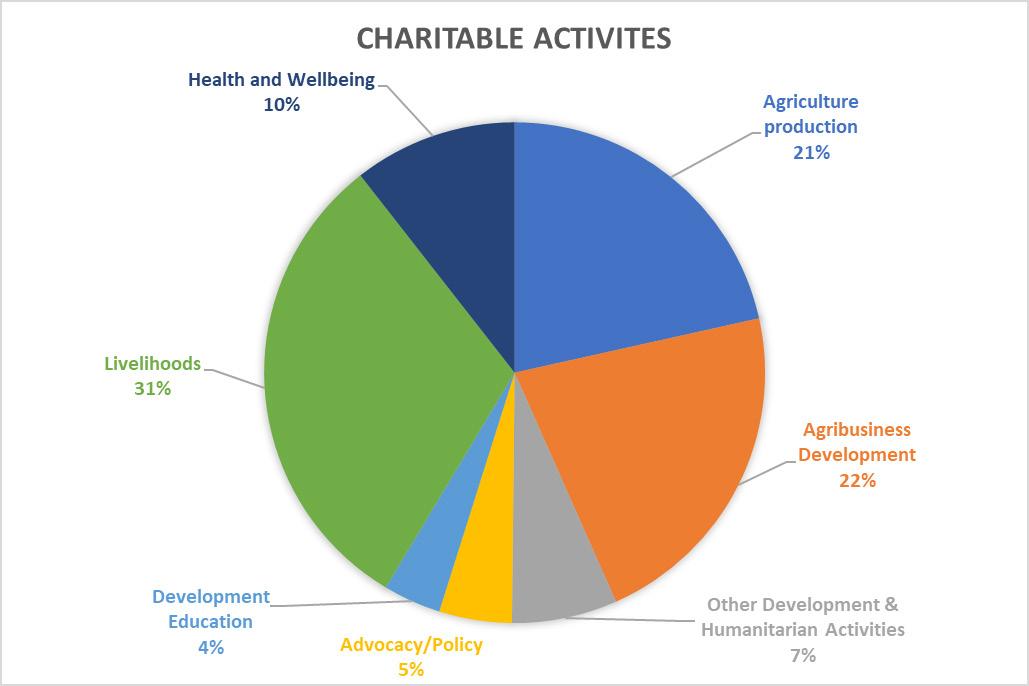
The above expenditure includes an allocation of Support Costs. The support costs include Finance, HR, IT, Governance, management and other administration costs. In the 2022 financial year, the support costs allocated to Charitable Activities were €3.9m (2021, €2.9m). As a % the support cost allocation remains at 9%.
The purpose of the Reserves Policy for Self Help Africa is to ensure the stability of the mission, programmes, employment and ongoing operations of the organisation. Our reserves are intended to provide an internal source of funds for situations such as a sudden increase in expenses, onetime unbudgeted expenses, unanticipated loss in funding, or uninsured losses.
As of 31 December 2022, the unrestricted reserves are €7.3m (2021, €8.3m). It is the Board’s view that this level of reserves needs to be enhanced. In the coming years a focus on balanced budgets, a review of the assets held by the Group and a review of the countries in which we operate will help achieve the desired level of unrestricted reserves.
In the 2021 Financial Statements, an estimate of expenditure was applied to a programme in Zambia which recorded expenditure for that programme based on the transfer of funds to our partner organisations. While this is an acceptable accounting policy, under SORP 2015, it is inconsistent with the method of recording expenditure applied across the Group. The group records expenditure when our partners report that the funds have been spent. This has resulted in a prior year adjustment of €2.4m.
The group’s forecasts and projections, taking account of reasonable possible changes in performance, show that the group will be able to operate within the level of its current cash and investment resources. The Board has a reasonable expectation that the organisation has adequate resources to continue in operational existence for a period of at least 12 months from the date of approval of these consolidated financial statements. Thus, they continue to adopt the going concern basis of accounting in preparing the annual consolidated financial statements. Further details regarding the adoption of the going concern basis is included in Note 1 to the financial statements.
For the financial year ended 31 December 2022
We are intent on retaining our financial stability while working to achieve our strategic goals. To continue delivering on our missions in support of the poorest communities in Lower Income Countries, the group needs to evolve. Our combined resources – of funding, personnel, experiences – will be blended to create an entity that is greater than the sum of our parts. At the end of 2022, the Group worked in 16 countries. In 2023 a scoping study was commissioned to advise on the future country footprint. This study looked at both the overall question of how many countries we should work in and which countries those should be. The aim of the study was to maximise our impact and ensure the best use of our resources. This will see the Group reduce the number of countries to 10 and will see a phase out of 6 country programmes in 2024 and 2025.
The Group structure will also be streamlined and companies/charities may be closed or permanently merged with other entities within the group. This will progress over 2024 and 2025.
There were no events subsequent to the financial year-end that required any adjustment to the financial statements.
The Group did not make any political contributions in the financial year (2021 - €nil) and as a result made no disclosures as required under the Electoral Act, 1997. The Group is required under the Regulation of Lobbying Act, 2015 to record any lobbying activity or communications with Designated Public Officials (DPOs). It has made any returns and submissions as required under the Act.
The measures that the directors have taken to secure compliance with the requirements of sections 281 to 285 of the Companies Act 2014 with regard to the keeping of accounting records, are the employment of appropriately qualified accounting personnel and the maintenance of computerised accounting systems. The company’s accounting records are maintained at the company’s registered office at 4th Floor, Joyce’s Court, 38 Talbot Street, Dublin 1, D01 C861.
The directors and secretary, who served at any time during the financial year, were as follows:
Directors
Carmel Fox
Martin Ryan
Pat Murphy
Jim Galvin
Catherine Fitzgibbon
Sheila Walsh
Jim Kinsella
Joe Healy
Geoff Meagher (Chair)
Kalongo Chitengi
Hadi Husani
Chinyere Almona (appointed 29/09/2022)
Company Secretary
Peter McDevitt (resigned 20/09/2022)
Pat Murphy (appointed 20/09/22)
Each of the persons who is a director at the date of approval of this report confirms that:
(i) so far as the director is aware, there is no relevant audit information of which the company’s auditors are unaware; and
(ii) the director has taken all the steps that they ought to have taken as a
director in order to make himself aware of any relevant audit information and to establish that the company’s auditors are aware of that information.
This confirmation is given and should be interpreted in accordance with the provisions of Section 330 of the Companies Act 2014.
Directors acknowledge that the directors are responsible for securing the company’s compliance with its relevant obligations; and
Directors confirm that the directors commenced the following three procedures in order to comply with the directors’ obligations during the financial year.
• the drawing up of a “compliance policy statement” setting out the company’s policies that, in the directors’ opinion, are appropriate to the company, and respecting compliance by the company with its relevant obligations;
• the putting in place of appropriate arrangements or structures that are, in the directors’ opinion, designed to secure material compliance with the company’s relevant obligations; and
• the conducting of a review, during the financial period of any arrangements or structures that have been put in place.
The auditors, Deloitte Ireland LLP, Chartered Accountants and Statutory Audit Firm, were appointed as the company’s auditors for the financial year. Deloitte Ireland LLP will resign as the company’s auditors after the financial statement sign off and directors’ intention is to carry out a tender process to appoint the company’s auditors in the coming months.
Approved by the Board and signed on its behalf by:

Jim Galvin Director

Geoff Meagher Director
Date: 18 July 2024
The directors are responsible for preparing the Report of the Directors and the consolidated financial statements in accordance with the Companies Act 2014. and the applicable regulations.
Irish company law requires the directors to prepare financial statements for each financial year. Under the law, the directors have elected to prepare the financial statements in accordance with FRS 102 The Financial Reporting Standard applicable in the UK and Republic of Ireland issued by the Financial Reporting Council, as applied in accordance with the provisions of the Companies Act 2014, and with the Accounting and Reporting by Charities Statement of Recommended Practice applicable to charities preparing their financial statements in accordance with FRS102 (“the Charities SORP”) (“relevant financial reporting framework”).
Under company law, the directors must not approve the consolidated financial statements unless they are satisfied that they give a true and fair view of the assets, liabilities and financial position of the Group and company as at the financial year end date and of the surplus or deficit of the Group and company for the financial year and otherwise comply with the Companies Act 2014.
In preparing those consolidated financial statements, the directors are required to:
• select suitable accounting policies for the parent company and the Group financial statements and then apply them consistently;
• observe the methods and principles in the Charities SORP;
• make judgements and estimates that are reasonable and prudent;
• state whether the financial statements have been prepared
in accordance with the applicable accounting standards, identify those standards, and note the effect and the reasons for any material departure from those standards; and
• prepare the financial statements on the going concern basis unless it is inappropriate to presume that the Group and company will continue in business.
The directors are responsible for ensuring that the Group and company keeps or causes to be kept adequate accounting records which correctly explain and record the transactions of the group and company, enable at any time the assets, liabilities, financial position and surplus or deficit of the group and company to be determined with reasonable accuracy, enable them to ensure that the consolidated financial statements and report of the directors comply with the Companies Act 2014 and enable the financial statements to be audited. They are also responsible for safeguarding the assets of the company and hence for taking reasonable steps for the prevention and detection of fraud and other irregularities.
Legislation in Ireland governing the preparation and dissemination of financial statements may differ from legislation in other jurisdictions. The directors are responsible for the maintenance and integrity of the corporate and financial information included on the group and company’s website.

Deloitte Ireland LLP Chartered Accountants & Statutory Audit Firm
AUDITOR’S REPORT TO THE MEMBERS OF GORTA (trading as Self Help Africa)
Report on the audit of the financial statements
Opinion on the financial statements of Gorta (trading as Self Help Africa) (“the company”)
In our opinion the group and parent company financial statements:
• give a true and fair view of the assets, liabilities and financial position of the group and parent company as at 31 December 2022 and of its incoming resources and application of resources, including its income and expenditure, of the group for the financial year then ended; and
• have been properly prepared in accordance with the relevant financial reporting framework and, in particular, with the requirements of the Companies Act 2014.
The financial statements we have audited comprise:
the group financial statements:
• the Consolidated Statement of Financial Activities (including income and expenditure account);
• the Consolidated Balance Sheet;
• the Consolidated Statement of Cash Flows; and
• the related notes 1 to 37, including a summary of significant accounting policies as set out in note 1.
the parent company financial statements:
• the Balance Sheet;
• the Statement of Cash Flows; and
• the related notes 1 to 37, including a summary of significant accounting policies as set out in note 1.
The relevant financial reporting framework that has been applied in their preparation is the Companies Act 2014 and FRS 102 ‘The Financial Reporting Standard applicable in the UK and Republic of Ireland’ issued by the Financial Reporting Council (“the relevant financial reporting framework”).
Basis for opinion
We conducted our audit in accordance with International Standards on Auditing (Ireland) (ISAs (Ireland)) and applicable law. Our responsibilities under those standards are described below in the “Auditor's responsibilities for the audit of the financial statements” section of our report.
We are independent of the group and parent company in accordance with the ethical requirements that are relevant to our audit of the financial statements in Ireland, including the Ethical Standard issued by the Irish Auditing and Accounting Supervisory Authority, and we have fulfilled our other ethical responsibilities in accordance with these requirements. We believe that the audit evidence we have obtained is sufficient and appropriate to provide a basis for our opinion.
Conclusions relating to going concern
In auditing the financial statements, we have concluded that the directors’ use of the going concern basis of accounting in the preparation of the financial statements is appropriate.
Based on the work we have performed, we have not identified any material uncertainties relating to events or conditions that, individually or collectively, may cast significant doubt on the group and parent company’s ability to continue as a going concern for a period of at least twelve months from when the financial statements are authorised for issue.
Our responsibilities and the responsibilities of the directors with respect to going concern are described in the relevant sections of this report.
Continued on next page/

/Continued from previous page
The other information comprises the information included in the Annual Report 2022, other than the financial statements and our auditor’s report thereon. The directors are responsible for the other information contained within the Annual Report 2022. Our opinion on the financial statements does not cover the other information and, except to the extent otherwise explicitly stated in our report, we do not express any form of assurance conclusion thereon.
Our responsibility is to read the other information and, in doing so, consider whether the other information is materially inconsistent with the financial statements or our knowledge obtained in the audit or otherwise appears to be materially misstated. If we identify such material inconsistencies or apparent material misstatements, we are required to determine whether there is a material misstatement in the financial statements or a material misstatement of the other information. If, based on the work we have performed, we conclude that there is a material misstatement of this other information, we are required to report that fact.
We have nothing to report in this regard.
As explained more fully in the Directors' Responsibilities Statement, the directors are responsible for the preparation of the financial statements and for being satisfied that they give a true and fair view and otherwise comply with the Companies Act 2014, and for such internal control as the directors determine is necessary to enable the preparation of financial statements that are free from material misstatement, whether due to fraud or error.
In preparing the financial statements, the directors are responsible for assessing the group and parent company’s ability to continue as a going concern, disclosing, as applicable, matters related to going concern and using the going concern basis of accounting unless the directors either intend to liquidate the group and parent company or to cease operations, or have no realistic alternative but to do so.
Auditor’s responsibilities for the audit of the financial statements
Our objectives are to obtain reasonable assurance about whether the financial statements as a whole are free from material misstatement, whether due to fraud or error, and to issue an auditor's report that includes our opinion. Reasonable assurance is a high level of assurance, but is not a guarantee that an audit conducted in accordance with ISAs (Ireland) will always detect a material misstatement when it exists. Misstatements can arise from fraud or error and are considered material if, individually or in the aggregate, they could reasonably be expected to influence the economic decisions of users taken on the basis of these financial statements.
A further description of our responsibilities for the audit of the financial statements is located on IAASA’s website at: https://iaasa.ie/publications/description-of-the-auditors-responsibilities-for-the-audit-of-the-financial-statements. This description forms part of our auditor’s report.
Opinion on other matters prescribed by the Companies Act 2014
Based solely on the work undertaken in the course of the audit, we report that:
• We have obtained all the information and explanations which we consider necessary for the purposes of our audit.
• In our opinion the accounting records of the parent company were sufficient to permit the financial statements to be readily and properly audited.
• The parent company balance sheet is in agreement with the accounting records.
• In our opinion the information given in the directors’ report is consistent with the financial statements and the directors’ report has been prepared in accordance with the Companies Act 2014.
Continued on next page/

/Continued from previous page
INDEPENDENT AUDITOR’S REPORT TO THE MEMBERS OF GORTA (trading as Self Help Africa)
Matters on which we are required to report by exception
Based on the knowledge and understanding of the group and parent company and its environment obtained in the course of the audit, we have not identified material misstatements in the directors' report.
We have nothing to report in respect of the provisions in the Companies Act 2014 which require us to report to you if, in our opinion, the disclosures of directors’ remuneration and transactions specified by law are not made.
Use of our report
This report is made solely to the company’s members, as a body, in accordance with Section 391 of the Companies Act 2014. Our audit work has been undertaken so that we might state to the company’s members those matters we are required to state to them in an auditor’s report and for no other purpose. To the fullest extent permitted by law, we do not accept or assume responsibility to anyone other than the company and the company’s members as a body, for our audit work, for this report, or for the opinions we have formed.
Heather Doolin
For and on behalf of Deloitte Ireland LLP
Chartered Accountants and Statutory Audit Firm
Deloitte & Touche House, 29 Earlsfort Terrace, Dublin 2
19 July 2024
(Including income and expenditure account) for the financial year ended 31 December 2022
There are no other recognised gains or losses other than those listed above and the net movement in funds for the financial year. All
and expenditure derive from continuing activities.
at 31 December 2022
The financial statements were approved and authorised for issue by the Board of Directors on 18 July 2024, and signed on its behalf by:


Jim Galvin Geoff Meagher DIRECTOR DIRECTOR
as at 31 December 2022
The financial statements were approved and authorised for issue by the Board of Directors on 18 July 2024, and signed on its behalf by:

Jim Galvin

Geoff Meagher DIRECTOR DIRECTOR
for the financial year ended 31 December 2022
Statement of
for the financial year ended 31 December 2022
The principal accounting policies are summarised below. They have all been applied consistently throughout the current and preceding financial year.
Gorta (t/a Self Help Africa) is a group and company incorporated in Ireland under the Companies Act 2014. The address of the registered office of the group and company is 4th Floor , Joyce’s Court , 38 Talbot Street, Dublin 8, Ireland. The company number of Gorta with the Companies Registration Office is 28228. The nature of the group and company’s operations and its principal activities are set out in the report of the directors. In accordance with Section 1180(8) of the Companies Act, 2014, the company is exempt from including the word “Limited” in its name. The company is limited by guarantee and has no share capital.
The financial statements have been prepared under the historical cost convention as modified by the revaluation of investments and in accordance with FRS 102 The Financial Reporting Standard applicable in the UK and Republic of Ireland issued by the Financial Reporting Council, as applied in accordance with the provisions of the Companies Act 2014, and with the Accounting and Reporting by Charities Statement of Recommended Practice applicable to charities preparing their financial statements in accordance with FRS102 (“the Charities SORP”) (“relevant financial reporting framework”).
The functional currency of the group and company is considered to be euro because that is the currency of the primary economic environment in which the company operates.
As permitted by section 291(3)(4) of the Companies Act 2014, the Group has varied the standard formats specified in that Act for the Statement of Financial Activities, the Balance Sheets and the Statement of Cash Flows. Departures from the standard formats, as outlined in the Companies Act 2014, are to comply with the requirements of the Charities SORP and are in compliance with Sections 4.7, 10.6 and 15.2 of the Charities SORP. The Company has taken advantage of the exemption available to it under section 304 of the Companies Act 2014, which permits a company that publishes its company and group financial statements together not to present its own statement of financial activities and related notes.
The Company meets the definition of a Public Benefit Entity under FRS102. As a registered charity, the Company is exempt from the reporting and disclosure requirements to prepare a directors’ report under section 325 (1) (c), Companies Act 2014 but does so in compliance with the Charities SORP. There is nothing to disclose in respect of directors’ interests in shares or debentures of the Company under section 329, Companies Act 2014.
The consolidated financial statements include the financial statements of the Company and its subsidiary undertakings, Self Help Africa, Self Help Africa (UK), Partner Africa, United Purpose, TruTrade and War on Want (N.I.) Ltd. The activities of all
six companies are mutually interdependent.
The work of the Group in Africa and across the globe, which is not carried out by one of the six subsidiary undertakings noted above, is carried out through branches located in the countries of operation. The branches are the local representatives of the Group. They do not have a separate legal personality and have been set up specifically to carry out the work of the Group.
Subsidiaries are entities controlled by the Group. The Group controls an entity when it is exposed to, or has rights to, variable returns from its involvement with the entity and has the ability to affect those returns through its power over the entity. The financial statements of subsidiaries are included in these consolidated financial statements from the date on which control commences until the date on which control ceases.
The group’s forecasts and projections, taking account of reasonable possible changes in performance show that the group will be able to operate within the level of its current cash and investment resources. The Board have a reasonable expectation that the organisation has adequate resources to continue in operational existence for a period of at least 12 months from the date of approval of these consolidated financial statements. Thus they continue to adopt the going concern basis of accounting in preparing the annual consolidated financial statements.
i Income from voluntary donations is recognised when received. As with many similar charitable organisations, independent groups from time to time organise fundraising activities and may operate bank accounts in the name of Gorta or Self Help Africa. However, as amounts collected in this way are outside the control of the group and company, they are not included in the financial statements until received by the group.
ii Proceeds from the sale of donated goods are recognised in the financial statements in the period in which they are realised. Volunteer time is not included in the financial statements.
iii Grants from the government and other agencies have been included as income from activities in furtherance of the charity’s objects and accounted for on a receivable basis.
iv Income from legacies is recognised when the likelihood of receipt is probable, the group is entitled to the funds and the amount can be measured with sufficient reliability.
v Interest income is recognised on a receivable basis.
vi Revenue refunds in respect of tax relief on voluntary donations are recognised on a receivable basis in so far as the receivable can be established with a reasonable amount of accuracy.
vii Other income reflects income earned by Partner Africa in respect of ethical trade related assignments and is recognised on a receivable basis. Such income is deferred until such time as the assignment occurs and the related expenditure is incurred.
i Charitable activities comprise expenditure incurred by the programme countries for the costs of the development programmes as well as costs incurred at headquarters that are directly related to the implementation of programmes. Expenditure is recognised in the period to which it relates. Expenditure incurred but unpaid at the balance sheet date is included in accruals and other creditors.
ii Expenditure on raising funds comprises all expenditure incurred by Self Help Africa on raising funds for the organisation’s charitable activities.
Items donated for resale are included in shop income when sold and no value is placed on stock at the year end. Any other gifts in kind which are deemed non-material are not included in the financial statements. Gifts in kind that can be valued with reasonable confidence will be included in the financial statements.
Funds held by the charity are:
i Unrestricted funds - these are funds which can be used in accordance with the charitable objects at the discretion of the Directors.
ii Designated funds - these are funds which have been set aside for particular purposes by the company itself, in furtherance of the company’s charitable objects.
iii Restricted funds - these are funds that can only be used for particular restricted purposes within the objects of the charity. Restrictions arise when specified by the donor or when funds are raised for particular restricted purposes.
Further explanation of the nature and purpose of each fund is included in the notes to the financial statements.
Tangible fixed assets are stated at cost less accumulated depreciation. Depreciation is provided for on a straight line basis at rates estimated to write off the cost over the year of their expected useful lives (taking account of residual value). The annual rates of depreciation are as follows:
Shop fittings
20% Straight line
Furniture and computer equipment
33.3% Straight line
Motor vehicles
33.3% Straight line
Intangible fixed assets represent purchased computer software applications and are capitalised when there is a clearly defined project, the related expenditure is separately identifiable and the outcome of the project has been assessed with reasonable certainty as to its technical, surplus generating and financial feasibility. In the absence of such criteria, these costs are expensed. Intangible fixed assets are amortised over their expected useful lives.
Financial assets and financial liabilities are recognised when the group and company become a party to the contractual provisions of the instrument. Financial liabilities are classified according to the substance of the contractual arrangements entered into.
All financial assets and liabilities are initially measured at transaction price (including transaction costs), unless the arrangement constitutes a financing transaction. If an arrangement constitutes a financing transaction, the financial asset or financial liability is measured at the present value of the future payments discounted at a market rate of interest for a similar debt instrument.
Financial assets are derecognised when and only when a) the contractual rights to the cash flows from the financial asset expire or are settled, b) the group and company transfers to another party substantially all of the risks and rewards of ownership of the financial asset, or c) the group and company, despite having retained some significant risks and rewards of ownership, has transferred control
of the asset to another party and the other party has the practical ability to sell the asset in its entirety to an unrelated third party and is able to exercise that ability unilaterally and without needing to impose additional restrictions on the transfer.
Financial liabilities are derecognised only when the obligation specified in the contract is discharged, cancelled or expires. Balances that are classified as payable or receivable within one year on initial recognition are measured at the undiscounted amount of the cash or other consideration expected to be paid or received, net of impairment.
All cash balances for planned development work are held in demand deposit accounts or short-term investment accounts at the highest interest rates available at the time of investment. Long term investments acquired by donation or through merger will not be held in the long term and will be disposed of within a reasonable time frame.
The group operates defined contribution schemes for employees. The assets of the schemes are held and managed separately from those of the charity by independently administered funds. The annual contributions are charged to the Statement of Financial Activities (SOFA).
Rentals applicable to operating leases where substantially all the benefits and risks of ownership remain with the lessor are charged to the Statement of Financial Activities (SOFA).
In order to secure the long-term viability of the Group and to maintain the smooth operation of the organisation, it is critical to ensure that the organisation has adequate reserves. The level of reserves is required to cover the following activities of the organisation:
• Provide funding for sustainable programmes.
• Meet contractual liabilities such as lease agreements, statutory staff payments and payments to creditors.
• Maintain a required level of funding available for overseas programmes during times of financial difficulty where fundraising income is diminished.
• To facilitate programme/project continuation especially where a partner submits a new or additional phase proposal in advance of the current activity being completed, in order to meet seasonal requirements (i.e. farming season) and prevent development gaps.
• Meet unanticipated expenses such as repairs and maintenance, currency variances and legal costs.
• Cover day to day expenditure of the Group.
• Ensure there is adequate funding should any winding up costs ever arise.
• Provide for any other unanticipated expenditure of significance.
The Board may designate unrestricted reserves for specific future expenditure such as Long-Term Programmes, sinking funds to cover repairs to Fixed Assets (or as required under the terms of any lease relating to
premises etc.) and any other potential future requirement(s). The Board has adopted a reserves policy based on foreseeable expenditure and in particular, long-term commitments to projects.
Transactions in foreign currency are recorded at the rate ruling at the date of the transaction. Monetary assets and liabilities denominated in foreign currencies are translated at the rate of exchange ruling at the balance sheet date. All differences are taken to the Statement of Financial Activities (SOFA). The balance sheets for the subsidiaries are translated at the prevailing year end rates and included in the consolidated balance sheet. The statements of financial activities for the subsidiaries are translated at an average rate for the year and included in the consolidated statement of financial activities. Any exchange gains or losses arising on consolidation are recognised in the statement of financial activities.
No charge to tax arises due to the exempt status of the Company and its subsidiaries, Self Help Africa, Self Help Africa (UK) and Gorta UK. Irrecoverable value added tax is expensed as incurred in these companies. Partner Africa is registered as a charity and benefits from corporation tax exemptions available to charitable bodies. It is however registered for VAT in the UK and Kenya and Partner Africa Kenya is subject to Kenyan corporation tax.
Concessionary loans are initially recognised and measured at the amount received or paid, with the carrying amount adjusted in subsequent years to reflect repayments and accrued interest as well as being adjusted if necessary for any impairment.
Provision is made in respect of onerous contracts where the unavoidable costs of meeting the obligations under the contract exceed the economic benefits expected to be received under it and a reliable estimate can be made of such obligations and benefits.
In the application of the company’s accounting policies, which are described in note 1, the directors are required to make judgements, estimates and assumptions about the carrying amounts of assets and liabilities that are not readily apparent from other sources. The estimates and associated assumptions are based on historical experience and other factors that are considered to be relevant. Actual results may differ from these estimates.
The estimates and underlying assumptions are reviewed on an ongoing basis. Revisions to accounting estimates are recognised in the period in which the estimate is revised if the revision affects only that period or in the period of the revision and future periods if the revision affects both current and future periods. Information about critical judgements in applying accounting policies that have the most significant effect on the amounts recognised in the financial statements is included in the accounting policies and notes to the financial statements.
The directors do not consider there are any critical judgements or sources of estimation requiring disclosure.
Income
Institutional Funders
Income received from Institutional Funders (cont.)
In 2021 €14,492k (2020: €13,203k) of incoming resources from
In 2022 €33,536k (2021: €14,492k) of incoming resources from charitable activities was restricted.
to the consolidated
for the financial year ended 31 December 2022
Note 7 Continued:
On 4th August 2021 Self Help Africa (SHA) entered into a legal and binding merger agreement with United Purpose (UP), a UK based charitable organisation operating across Africa, Latin America and South Asia. On the 4th of August a fair value assessment was carried out on the assets and liabilities of UP and a Gift in Kind valuation was calculated and included in the consolidated financial statements. See note 21 for fair value split of assets and liabilities.
Field programme expenditure has been incurred in the following thematic areas
Field
* This work is carried on in over forty countries throughout Africa. It incorporates the
relates to the group.
Expenditure on raising funds represents fundraising costs to raise both restricted and unrestricted income. This is analysed as follows:
Support costs which are allocated to activities have been incurred against the following thematic areas:
Transfers between funds represent movements of funds between projects. Transfers from restricted to unrestricted are as a result of a review of fund balances to identify funds held in restricted funds on projects that are now complete. If the likelihood of donor clawback is remote funds are classified as unrestricted.
The net income/(expenditure) for the financial year is stated after charging/(crediting):
remuneration, including expenses - Audit of the group financial statements (a) -
(a)
remuneration, including expenses -
(a)
(a)
(a) This includes VAT. No amounts were paid to the group auditors in relation to advisory, tax advisory or other assurance services.
15. Taxation
has been provided for in the Kenyan branch of Partner Africa as follows:
No charge to tax arises due to the exempt status of the Company and its subsidiaries, Self Help Africa, Self Help Africa (UK), War on Want NI and TruTrade. Irrecoverable value added tax is expensed as incurred in these companies. Partner Africa is registered as a charity and benefits from corporation tax exemptions available to charitable bodies. It is however registered for VAT in the UK and Kenya and Partner Africa Kenya is subject to Kenyan corporation tax.
to the consolidated financial statements for the financial year ended 31 December 2022
Staff costs are comprised as follows:
No employee of the group acts as director.
The number of employees whose salaries (excluding employer pension contributions and employer PRSI) were greater than €60,000 were as follows:
Directors are not remunerated but are entitled to be reimbursed for out-of-pocket expenses incurred in the course of carrying out their duties. Travel and accommodation expenses relating to meetings of the Board and subsidiary Boards that were either borne by the Group or reimbursed to the relevant Board members amounted to €380 in 2022 (2021: €340).
In addition, Board members may periodically visit one of the Group’s countries of operation in order to ensure that they are familiar with Self Help Africa’s work or attend events overseas on behalf of the Group. The cost of these visits (which comprise medicals, visas, flights and accommodation) are generally borne by the group.
The total remuneration for the group key management personnel (which includes gross pay, employer insurance contributions, employer pension contributions and any other remuneration including benefits in kind) for the financial year amounted to €781,394 (2021: €605,249) and this relates to six personnel (2021: five personnel).
The remuneration of each individual subsidiary entity’s key management team is disclosed in the respective subsidiary entity individual financial statements.
Name Registered Address
Self Help Africa (UK)
Westgate House, Dickens Court, 25 Hills Lane, Shrewsbury, SY1 1QU
War on Want (N.I.) Ltd 61 Duncairn Gardens, Belfast, BT15 2GB
Partner Africa
Dickens Court, 25 Hills Lane, Shrewsbury, SY1 1QU
TruTrade Bank of Africa House, 4th Floor, Westlands, Nairobi, Kenya
United Purpose 1st Floor, Wellington House, Wellington Street, Cardiff, CF11 9BE
Self Help Africa
Kingsbridge House, 17-22 Parkgate Street, Dublin 8
Improve food, nutrition, and income security for smallholder farmers in Africa.
Operates charity shops across Northern Ireland. Entity is being wound down and will be struck off the charities register upon completion.
Delivers high quality and innovative ethical audits and responsible business advisory services to clients
Increasing smallholder farmer income through integrating smallholder’s producers into sustainable value chains.
Strives to end poverty and inequality by being a leader in community led developments and grass roots innovation.
Dormant entity and will be Struck off in 2024
On 4th August 2021 Self Help Africa (SHA) entered into a legal and binding merger agreement with United Purpose (UP), a UK based charitable organisation operating across Africa, Latin America and Southeast Asia. On the 4th of August a fair value assessment was carried out on the assets and liabilities of UP and a Gift in Kind valuation was calculated and included in the consolidated financial statements. A provision was included on the 4th of August for committed project funds for greater than one year. The impairment as a result of the deficit in United Purpose in 2022.
Group and Company: Investments relate to a bequest of shares, the market value of which at 31 December 2022 was €178,143 (2021: €241,943).
Amounts falling due after more than one financial
(a) Group:
(b) Company:
(Note 30)
Other amounts payable (Note 30)
The carrying value of the group and company’s financial assets and liabilities, fair value gains and losses are summarised by category below:
the
Financial Liabilities
Measured at undiscounted amount payable
Measured at Fair value through the profit and loss
At 31 December 2021 the company had total future minimum commitments under non cancellable operating leases as follows:
The company operates employer sponsored defined contribution pension schemes which are available to all staff. During the year, the charity made contributions in respect of its employees who elected to contribute. The assets of the scheme are held separately from those of the company, in externally managed funds. The pension expense for the financial year amounted to €342,411 (2021: €216,698). Balance outstanding at financial year end €0 (2021: €0).
A provision relating to the group has been recognised which represents a shortfall on committed projects
The amount €463,960 has been classified in creditors greater than one year. This was recognised as a fair value adjustment on the acquisition of UP.
ended 31 December 2022
31. Reconciliation of net expenditure to net cash used by charitable activities
Gorta’s consolidated financial statements combine the activities of Gorta in Ireland and Self Help Africa (UK), United Purpose, Partner Africa, War on Want (N.I.) Ltd, and TruTrade. The net income/(expenditure) for the year, and the funds of the charity of each of the group companies at the financial year-end are detailed below.
for the year 31/12/2022
(i) Reconciliation of funds:
(iii) Movements in funds:
Currency risk
Much of the organisation’s costs, particularly overseas costs, are denominated in euro and local currency while most income is received in euro. A strengthening of the local currency against the euro could have an adverse effect on Gorta’s ability to deliver its planned programme of work. These currency risks are monitored on an ongoing basis.
Cash flow risk
Gorta hold a number of bank accounts deposited in a number of different financial institutions ensuring the security of our funds and also endeavouring to maximise the return available. The organisation’s activities expose it primarily to the financial risks of changes in interest rates. Interest bearing assets are held at fixed rates to ensure certainty of cash flows.
Credit risk
The organisation’s principal financial assets are bank balances and cash, trade and other receivables, and current asset investments. The credit risk on cash at bank and current asset investments is limited because the counterparties are banks with high credit-ratings assigned by international credit-rating agencies. The organisation has no significant concentration of credit risk, with exposure spread over a number of counterparties and customers.
Background
In 2021 SHA Zambia, a branch of the Company, treated payments they made to partners as expense items in their Income and Expenditure account. This was in contravention to the organisations accounting policies which state that payments made to partners should be booked to the balance sheet and only released to the Income and Expenditure account when the partner submits appropriate expenditure verification reports. This was adjusted for as a prior year adjustment in the 2022 Financial Statements of SHA Zambia. As the amount is material for the group, the group accounts also have to reflect this prior year adjustment. The prior year adjustment will also impact cost allocation across thematic categories and support costs as reflected in Note 9 and 11 above as costs are allocated on a percentage basis across expenditure categories (Note 9) and support costs (note 11).
Self Help Africa Inc. is a not-for-profit organisation registered in the United States of America. Self Help Africa Inc. (SHA Inc.) is governed by an independent board of directors which retains full control over the financial and operating policies of the company and is not controlled by the Gorta Group. The results and operations of SHA Inc. are not consolidated in these financial statements. During the financial year SHA Inc. on-granted €597,484 of restricted income received (2021: €79,815) and €nil of voluntary income raised (2021: €120,299) to Gorta t/a Self Help Africa projects. Total amounts granted by SHA Inc. to Gorta t/a Self Help Africa of €597,484 (2021: €200,114) have been included in the accounts of Gorta t/a Self Help Africa under income and endowments and expenditure.
At the end of 2020 SHA Inc. owed €119,654 to Self Help Africa (UK) in relation to funds that were received in the US that were due to be forwarded to Self Help Africa (UK) in relation to programmes implemented in West Africa. Self Help Africa (UK) used its own funds to implement these programmes. Due to an adverse fundraising environment in the US, this debt was unlikely to be repaid in the short to medium term. A provision for non-repayment of this amount has been made in the Gorta accounts in 2020. A balance of €49,947 remained outstanding at 31 December 2022 (2021: €34,679) represented by a loan repayable by SHA Inc. to Gorta t/a Self Help Africa.
No events have occurred since the balance sheet date that require adjustment or disclosure.
